

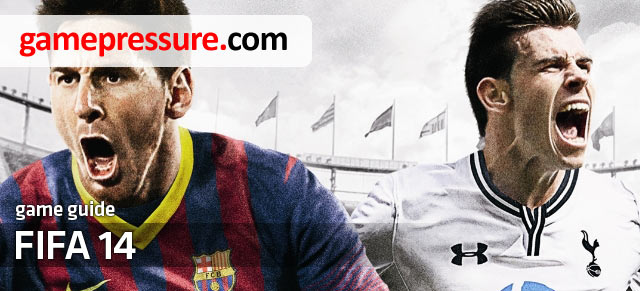
This guide to FIFA 14 is a complete guide into the world of virtual football, created by the Canadian branch of the EA Sports studio. The most recent installment traditionally carries numerous innovations, not only with regard to the structure of the gameplay, but also in the field of individual game modes, especially when it comes to multiplayer and manager modes. Thanks to numerous illustrations, presents virtually all of the aspects of the football competition. This guide includes:
The controls that are used to perform an individual piece of play have been given in bold. To make it easier to navigate in the multiplayer modes and make individual elements stand out, we have color-coded this guide.
Amadeusz "ElMundo" Cyganek
Michal "Diagoras" Myszakowski ()
In this chapter you will find a complete PlayStation 3 control scheme for configurations: classic, alternative and "two buttons".
Attacking

Through ball

Lob pass/Cross/Header

Shoot/Volley/Header

Short pass/Header

Player run/Modifier

Finesse Shot Modifier

Pace Control

Sprint

Move

Tactics and Mentality
Defence

Rush Goalkeeper (hold down)

Sliding Tackle

Tackle/Push or Pull

Contain

Change Player

Teammate Contain

Pace Control

Sprint

Move

Tactics and Mentality
Attacking

Through ball

Shoot/Volley/Header

Lob pass/Cross/Header

Short pass/Header

Player run/Modifier

Finesse Shot Modifier

Pace Control

Sprint

Move

Tactics and Mentality
Defence

Rush Goalkeeper (hold down)

Tackle/Push or Pull

Sliding Tackle

Contain

Change Player

Teammate Contain

Pace Control

Sprint

Move

Tactics and Mentality
Attacking

Shot

Pass

Sprint (optional)

Move
Defence

Sliding Tackle

Contain as Defender

Change Player (optional)

Sprint (optional)

Move
In this chapter you will find a complete Xbox 360 control scheme for configurations: classic, alternative and "two buttons".
Attacking

Through ball

Lob pass/Cross/Header

Shoot/Volley/Header

Short pass/Header

Player run/Modifier

Finesse Shot Modifier

Pace Control

Sprint

Move

Tactics and Mentality
Defence

Rush Goalkeeper (hold down)

Sliding Tackle

Tackle/Push or Pull

Contain

Change Player

Teammate Contain

Pace Control

Sprint

Move

Tactics and Mentality
Attacking

Through ball

Shoot/Volley/Header

Lob pass/Cross/Header

Short pass/Header

Player run/Modifier

Finesse Shot Modifier

Pace Control

Sprint

Move

Tactics and Mentality
Defence

Rush Goalkeeper (hold down)

Tackle/Push or Pull

Sliding Tackle

Contain

Change Player

Teammate Contain

Pace Control

Sprint

Move

Tactics and Mentality
Attacking

Shot

Pass

Sprint (optional)

Move
Defence

Sliding Tackle

Contain as Defender

Change Player (optional)

Sprint (optional)

Move
In this chapter you will find a complete PC control scheme for both possible options - keyboard only and keyboard + mouse. Each scheme has three additional configurations: classic, alternative and "two buttons".
Attacking

Through ball

Lob pass/Cross/Header

Shoot/Volley/Header

Short pass/Header

Player run/Modifier

Finesse Shot Modifier

Pace Control

Sprint

Left Stick Up

Left Stick Down

Left Stick Left

Left Stick Right

Pause

Button Help

Tactics

Mentality

Custom Tactic

Mentality

Right Stick Up

Right Stick Left

Right Stick Down

Right Stick Right
Defence

Rush Goalkeeper (hold down)

Sliding Tackle

Tackle/Push or Pull

Contain

Change Player

Teammate Contain

Pace Control

Sprint

Left Stick Up

Left Stick Down

Left Stick Left

Left Stick Right

Pause

Button Help

Tactics

Mentality

Custom Tactic

Mentality

Right Stick Up

Right Stick Left

Right Stick Down

Right Stick Right
Attacking

Through ball

Lob pass/Cross/Header

Shoot/Volley/Header

Short pass/Header

Player run/Modifier

Finesse Shot Modifier

Pace Control

Sprint

Left Stick Up

Left Stick Down

Left Stick Left

Left Stick Right

Pause

Button Help

Tactics

Mentality

Custom Tactic

Mentality

Right Stick Up

Right Stick Left

Right Stick Down

Right Stick Right
Defence

Rush Goalkeeper (hold down)

Sliding Tackle

Tackle/Push or Pull

Contain

Change Player

Teammate Contain

Pace Control

Sprint

Left Stick Up

Left Stick Down

Left Stick Left

Left Stick Right

Pause

Button Help

Tactics

Mentality

Custom Tactic

Mentality

Right Stick Up

Right Stick Left

Right Stick Down

Right Stick Right
Attacking

Shoot/Volley/Header

Short pass/Header

Player run/Modifier

Sprint

Left Stick Up

Left Stick Down

Left Stick Left

Left Stick Right
Defence

Tackle/Push or Pull

Contain

Change Player

Sprint

Left Stick Up

Left Stick Down

Left Stick Left

Left Stick Right
Attacking

Through ball

Lob pass/Cross/Header

Shoot/Volley/Header

Short pass/Header

Player run/Modifier

Finesse Shot Modifier
Move mouse
Pace Control
Move mouse
Sprint
Move mouse
Move
R + Move mouse
Teammate Run

Button Help

Tactics

Mentality

Custom Tactic

Mentality
MMB + Move mouse
Tricks
Defence

Rush Goalkeeper (hold down)

Sliding Tackle

Tackle/Push or Pull

Contain

Change Player

Teammate Contain
Move mouse
Pace Control
Move mouse
Sprint
Move mouse
Move
R + Move mouse
Mark Man

Pause

Button Help

Tactics

Mentality

Custom Tactic

Mentality
Attacking

Through ball

Lob pass/Cross/Header

Shoot/Volley/Header

Short pass/Header

Player run/Modifier

Finesse Shot Modifier
Move mouse
Pace Control
Move mouse
Sprint
Move mouse
Move
R + Move mouse
Teammate Run

Button Help

Tactics

Mentality

Custom Tactic

Mentality
MMB + Move mouse
Tricks
Defence

Rush Goalkeeper (hold down)

Sliding Tackle

Tackle/Push or Pull

Contain

Change Player

Teammate Contain
Move mouse
Pace Control
Move mouse
Sprint
Move mouse
Move
R + Move mouse
Mark Man

Pause

Button Help

Tactics

Mentality

Custom Tactic

Mentality
Attacking

Shoot/Volley/Header

Short pass/Header

Player run/Modifier
Move mouse
Sprint
Move mouse
Move
Defence

Tackle/Push or Pull

Contain

Change Player
Move mouse
Sprint
Move mouse
Move
Low short pass
the button used for short pass + direction
Low long pass
the button used for short pass + direction
Lob
the button used for lob + direction
Ground through ball
the button used for through ball and choose direction
Lob through ball
the button used for through ball + modifier + direction
Lob cross
lob + direction
Low cross
2x lob + direction
Ground cross
3x lob + direction
Shoot
the button used for shot + direction
Finesse shot
the button used for shot + finesse shot modifier + direction
Chip shot
the button used for shot + modifier + direction
Sliding Tackle
the button used for slide
Tackle
the button used for tackle
Teammate Contain
teammate contain button
Charge
the button used for goalkeeper charge
Throw
the button used for pass + direction + choose strength
Drop kick
the button used for lob <br>+ fill strength gauge
Pass
the button used for pass + direction
Change executor
R2 (RT, Shift)
Lob cross
lob/cross button
Low cross
2x lob/cross button
Ground cross
3x lob/cross button
Corner pass
pace control button
Using additional players
for the second player - pace control button, for the third one - finesse shot modifier
Changing the player
sprint button
Strong free kick
modifier + shot button
Finesse free kick
shot + finesse shot modifier
Powerful free kick
shot button, modifier and finesse shot modifier
Strong penalty
shot button
Finesse penalty
finesse shot modifier + shot button
Panenka chip shot
modifier + shot button
Feint penalty
shot button when running
Change player
sprint button
Sight
pace control button
Move the well
L2 + R2 (LT + RT, MMB + Left Ctrl
Wall creep
R1 (RB, D)
Charging out of the well
pass button
Adding players to the wall
trigger run/modifier
Elastico
the analog stick right and afterwards left along its lower perimeter
Roulette right
move the analog down and move along 3 of the perimeter, counter-clockwise
Roulette left
move the analog down and move along 3 of the perimeter, clockwise
Ball roll left
move the analog stick left
Ball roll right
move the analog stick right
Heel flick
move the analog stick up and then quickly down
Rabona
press the following combination: pace control and throw in, followed by: pass and left analog stick down
Sombrero
hold the left analog stick and choose the direction in which you want bounce off the ball which is flying towards you
Around the World
perform a complete turn with the right analog stick
Bottom dance
press the modifier and double press the tackle slide/throw in button
Shoe shine
press the pace control button and the shot button
Standing and pointing to sky
press and hold the pace control button and the shot button
Double back flip
press the modifier button and turn the analog stick right
Violinist
press the pace control and the throw in buttons at the same time
Spanish archer
press and hold the pace control button and at the same time push the through pass/goalkeeper charge button
Ai Se Eu Te Pego
press the sprint button and the right analog stick at the same time
Why always me?
press finesse modification button and double press the perpendicular pass/goalkeeper charge button
Cradle swing
hold down the sprint button and press the perpendicular pass/goalkeeper charge button
The salute
press the finesse modifier and the perpendicular pass/goalkeeper charge buttons at the same time
Throw
contain button + direction
Charge
goalkeeper charge button
Goalkeeper corner
finesse shot modifier
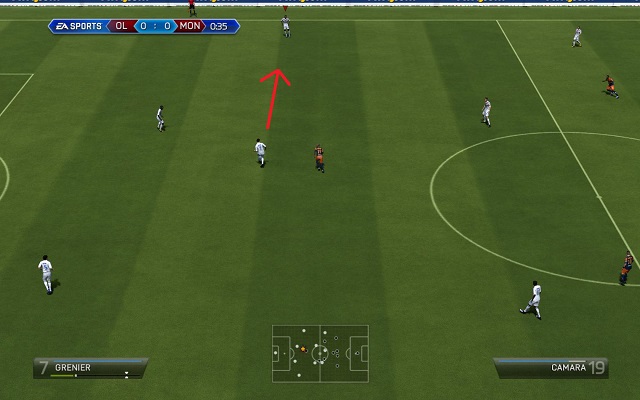
A short pass on the surface of the field is the easiest, and most reliable, way to pass the ball between players. To perform it press the regular pass key and indicate the direction in which the ball is to be passed. Use it while playing the ball in the region of your own goal, to send it possibly as far from your half as quickly as possible. Also, you should use it while attempting 1-2 passes.
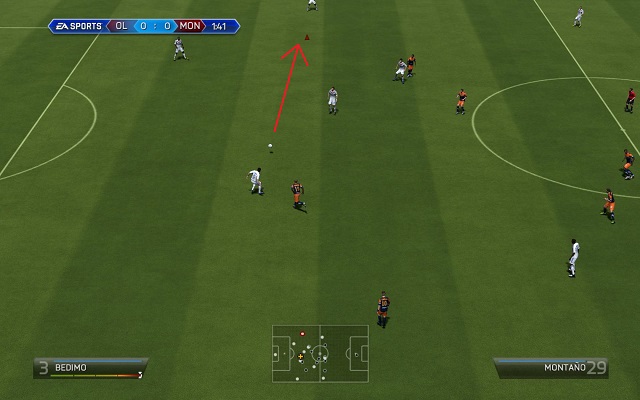
A long pass is especially useful to perform swift counter-attacks and plays in order to with the intent to let the ball through the player that it was originally aimed at. To perform a long pass, press and hold down the short pass key and specify the direction in which you want to pass the ball.
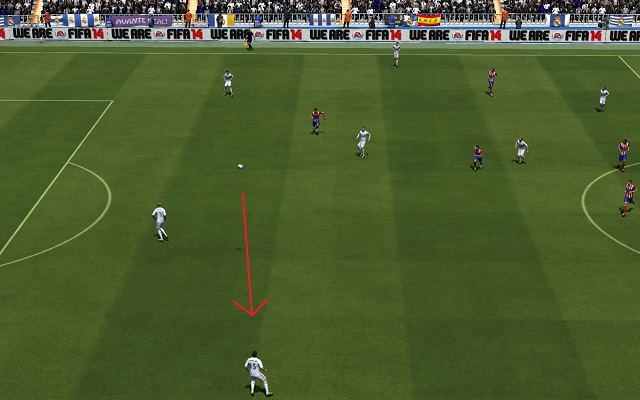
The lobbed pass is a perfect way to play the ball if you want it to go above the players standing in the way of a regular ground pass, and also a perfect choice in situations when you want to get the ball to the other half of the field. To perform it, press the key for centering and the direction in which you want to send the ball. At the same time, pay attention to the strength bar. Often, this kind of techniques are risky because of the problems to catch the ball and diminished precision. That is why they are to be used only if you are sure that a prospective failure will not enable a direct attack at your goal.
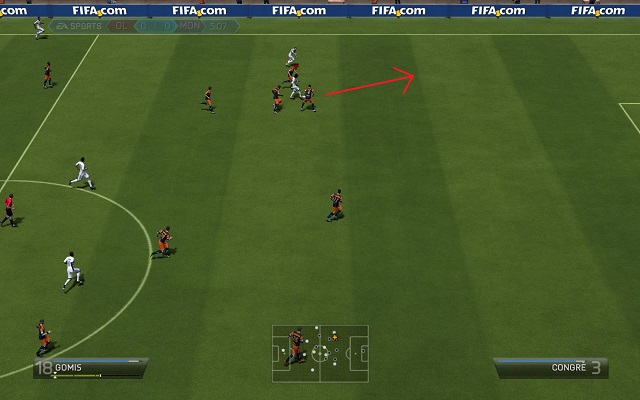
A perpendicular pass over the surface works perfectly when you want to pass the ball to an empty field and use the player attempting to use the uncovered area - this especially concerns situations played along the sides of the field. It is also a good way to play the ball to the forwarding forward who is attempting to escape defensive players trying to catch him on the offside. To perform a perpendicular pass over the surface, you need to press the perpendicular pass key and select the direction in which you want to send the ball.
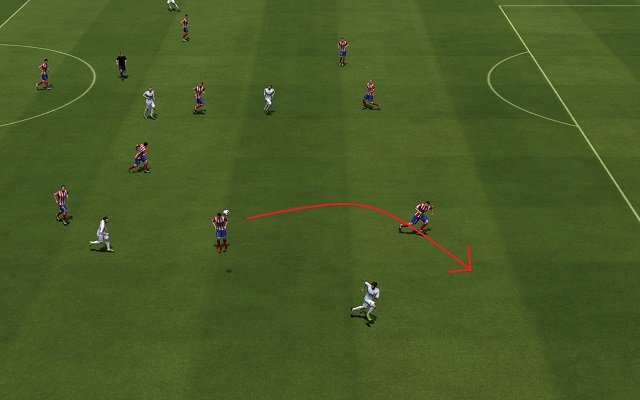
The lobbed perpendicular pass is a good way to avoid defense in the case when you experience problems finding a gap between defensive players of the other team. It is also a great way to perform a swift counter-attack where you can distance the opponents returning to their own half, by performing a lobbed pass. To perform a perpendicular lobbed pass press the perpendicular pass and the modifier - you should also indicate the direction in which the ball is to be sent.
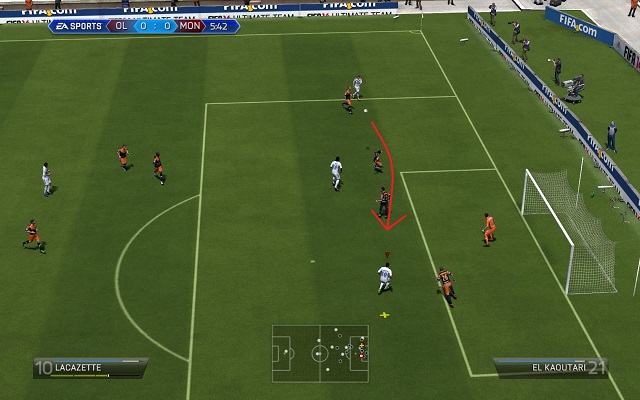
The cross is used mainly for sending the ball into the penalty to the players in the opponent's penalty field, who can then hat-trick the ball into the opponent's goal. To perform it, you need to press the cross key and indicate the direction in which you want to send the ball. Do not exaggerate with the strength - kicking the ball too hard will send it outside of the field. You should also avoid centering under the opponent's pressure, the chances that it will be successful are very low.
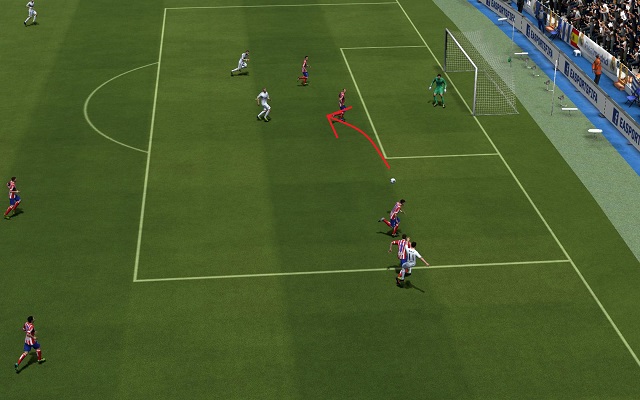
Low cross is a perfect way to finish an attack with the spectacular flying header or a volley kick - the ball goes then at the height of the abdomen. To perform it, double-tap the cross key and indicate the direction in which you want to send the ball. At the same time, try to pass the ball in this way to a specific player - it is a bit more difficult than lobbed centering , because it requires you to be more precise. You should use it especially to pass the ball to the short post, when a player who is not covered by anyone, is in line.
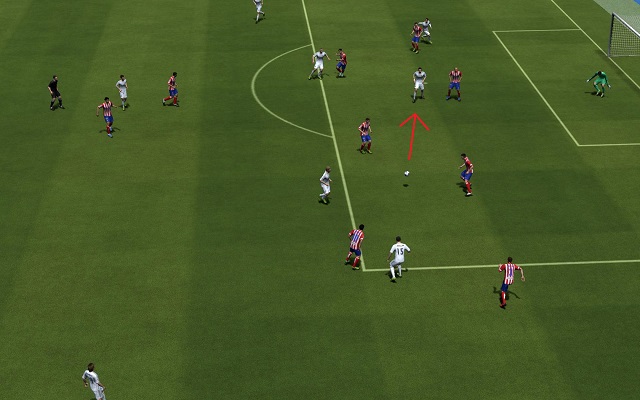
Ground cross allows you to play the ball a few centimeters above the surface - the ball's speed is very high, which allows you to take a shot at the opponent's goal. To perform it, triple-tap the cross key and select the direction, in which you want to send the ball. Use it when there are many opponent players in the penalty field, and you do not have a clear option to play the ball - a strong kick of this kind may surprise the opponent and cause commotion within the field. This is also a good substitute for the perpendicular pass - a ball played low into the area of the fifth meter in front of the goal, may allow to finish the attack with a simple kick that will send the ball into the goal.
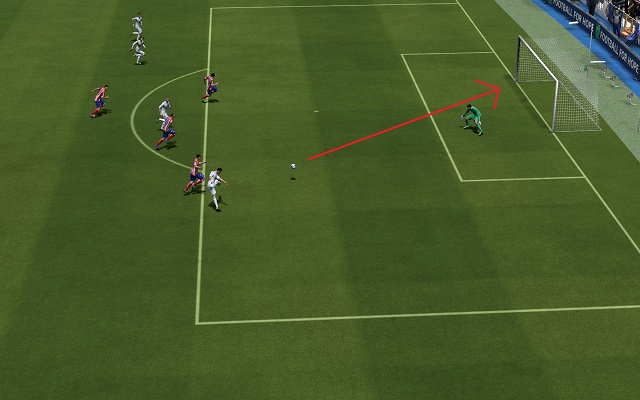
A strong shot is the easiest way to encourage threat to the opponent's goal. A well-aimed kick that is strong enough, sent into one of the corners of the field, causes massive problems for the goalie, who will have to go to great lengths to prevent his team from losing a goal. In the case of a lack of any ideas for the attack, it is a good idea to attempt surprising the goalie with a shot from a larger distance - a powerful kick from the fortieth meter, even into the center of the goal, may result in a corner kick for your team, or in a situation where the goalie "spews" the ball to one of your players in the penalty field. To perform it, press the shot key and indicate the direction in which you want to send the ball.
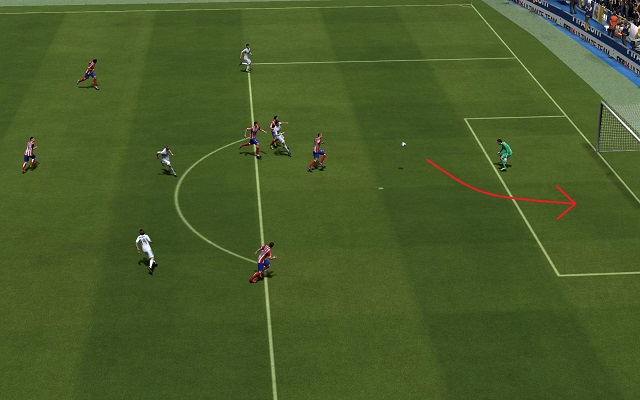
The finesse shot is a perfect choice for players with appropriate technical skills who can precisely send the ball into the specific corner of the goal. The technical "spinner" into the selected region of the goal is a chance to avoid the goalie who is desperately defending the goal, and to shoot at the predetermined spot. This is also a great opportunity to use the one-on-one situations by sending the ball next to the goalkeeper in front of you or catch him in half-step to make it impossible for him to react to the attack suitably. To perform this shit, press the shot button and the modifier of the finesse shot, and then the direction in which you want to send the ball.
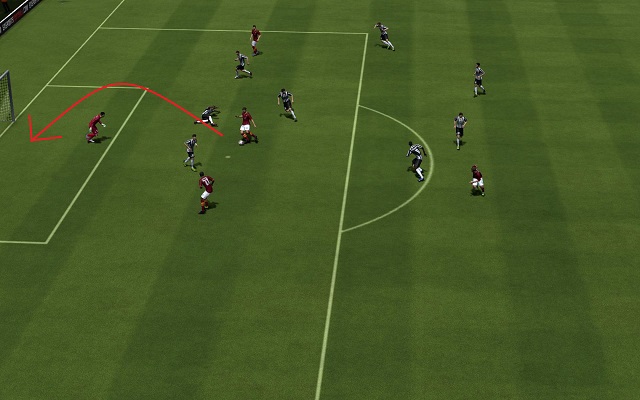
This attack proves to be immensely effective when performed by a very skilled player. It proves to be effective mainly in situations when the goalie walks off the goal, goes down and tries to shovel the ball from you - then, sending the ball over him usually ends in scoring a goal. This is also a good way to finish the attacks at the moment when you take a shot at the empty goal and a defender attempts a desperate slide to defend the shot. Lobbing the defender slightly helps then prevent failing a 100% chance at the goal. To perform the chip pass, press the shot key and the modifier, and indicate direction in which you want to send the ball.
Although it goes without saying that your main aim, in playing a game, is to win, it is key to make sure that when it comes to the defense, everything works like a well-maintained machine. Effective stopping of the opponent's attacks requires you, first of all, to create a well coordinated defense and to adopt a proper strategy tailored to fit the opponent's attacks.
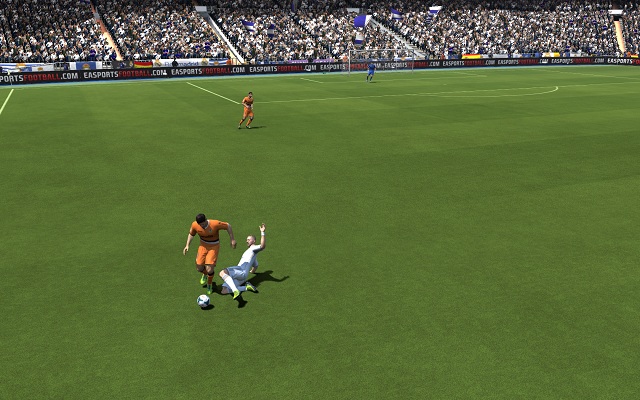
The sliding tackle is one of the most effective and radical techniques of regaining the ball - well performed, it lets you immediately stop the attack of your enemy and usually gives your team members a good chance of returning to their normal position, as it often causes the ball to leave the field. In order to perform it, press the sliding tackle button. Always try doing a clean tackle - a badly performed sliding tackle can result is receiving a yellow or even red card. Avoid tackling from behind, sliding into a running enemy without much thought. However, if the situation is hopeless and the only chance of stopping an enemy is a sliding tackle from behind, you should try taking the risk, especially if you're winning.
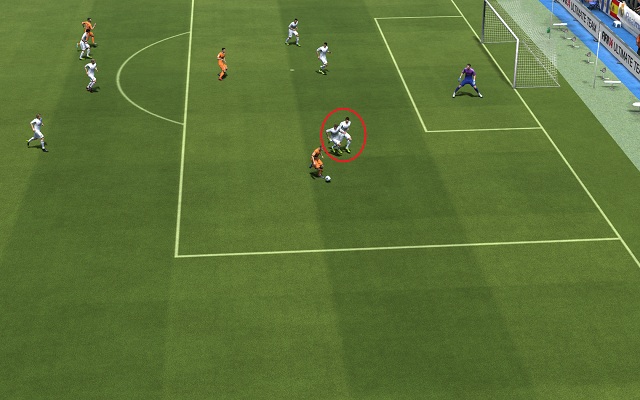
Tackling is the easiest way of stopping an enemy action - it's a great way of using physical superiority in a direct duel. Stopping the with your leg lets you perform an immediate counter attack. In order to tackle the ball, press the tackle button.
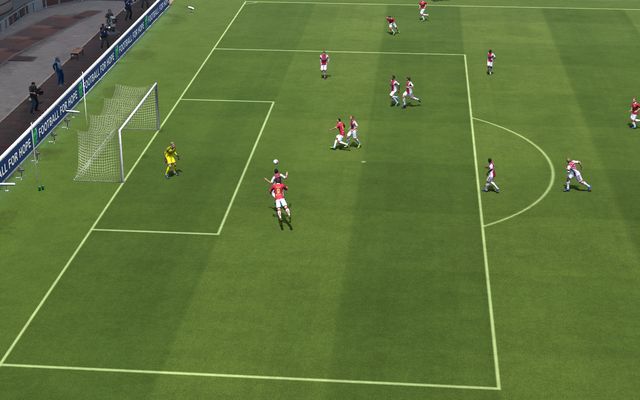
What's the best way of getting rid of a ball going directly into the penalty zone? It's of course knocking it away with a firm header. Half of success here is properly setting yourself against the ball and covering the enemy to whom the ball is heading - even if you can't manage to intercept the ball, you will disturb the enemy and make scoring a goal much harder. In order to clear the ball out of the penalty, press the header button. Avoid shooting the ball to the area in front of the goal - it might end with an immediate shot at the goal which can surprise your goalkeeper.
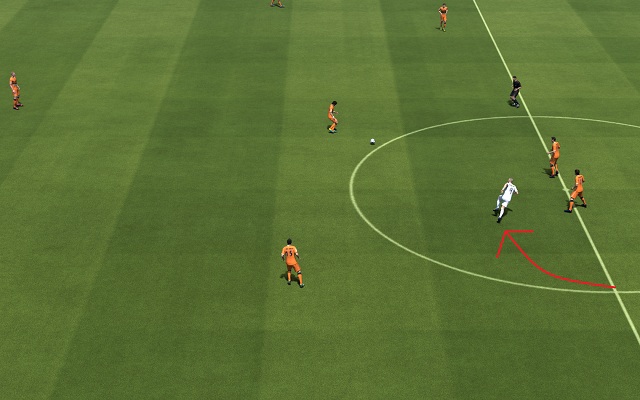
Overtaking an enemy is a hard technique which requires you to foresee the possible variants of the enemy's behavior. It's worth trying to run in front of the enemy and taking over the ball during a pass, especially on the enemy's side - the defence gap can be easily filled and doesn't lead to a dangerous situation. It's also a chance of beginning a fast counter attack and surprising the enemy who can't reorganize his defence in a matter of seconds.

Often attacking the enemy individually isn't enough - there's always a change that the enemy will dribble past you or pass the ball to a teammate. That's when you should use your own teammate's help which will eliminate the possibility of passing the ball and limit the enemy's options. This tactic is especially effective when the enemy is nearby a corner - taking over the ball with two players is much more effective and easier then. In order to use your teammate's help, press and hold the contain button.
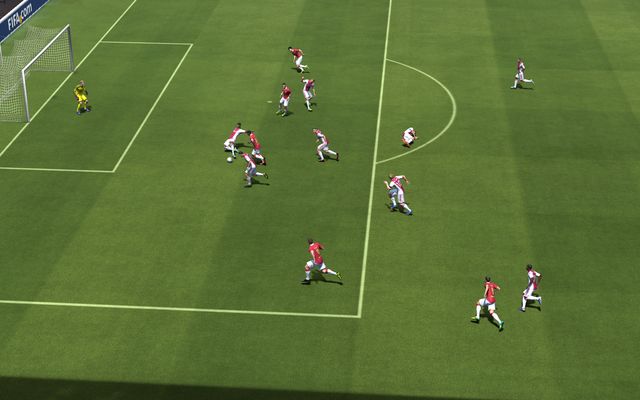
Blocking a shot in the penalty with a sliding tackle is exceptionally difficult and very risky - carelessly sliding into an enemy in the penalty zone automatically ends with a penalty shot the only way to succeed is performing a completely tackle. Timing is essential here, as you have to slide right at the moment when the enemy is preparing to make a shot - in the penalty zone, the difference between a foul and a clear intervention is measured in split seconds, you have to somewhat predict what your enemy is going to do.
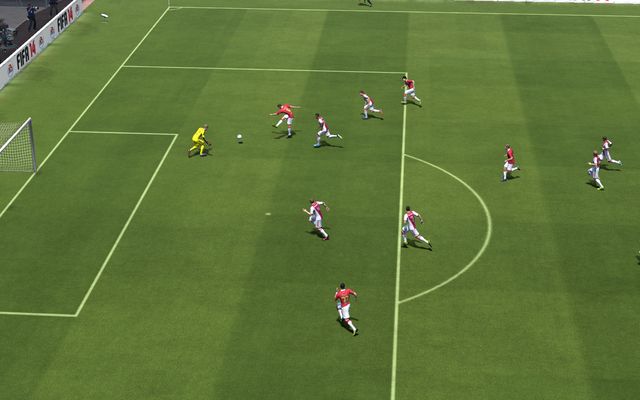
Properly heading out of the goal and lowering the angle at which the enemy can shoot can give you - without exaggeration - 70 to 80% success in defence. Timing is essential here - heading out too late will give the enemy a field to shoot, while doing it too early might end up in the ball being lobbed above the goalkeeper. In order to head out of the goal, push the charge button. Don't move back to the goal during an enemy's attack - it usually ends up with catching the goalkeeper during a wide step and is a straight way to scoring a goal.
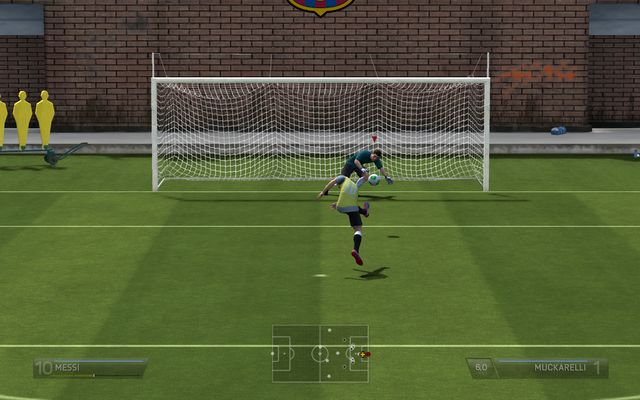
Let's be honest here - there's pretty much now good way of defending a penalty. In fact everything depends on luck and whether you feel the enemy's intentions. Having said that, it's a fact that the enemy usually aims at both lower corners of the goal and there's where you should search for any luck. Other than that, it's all luck.
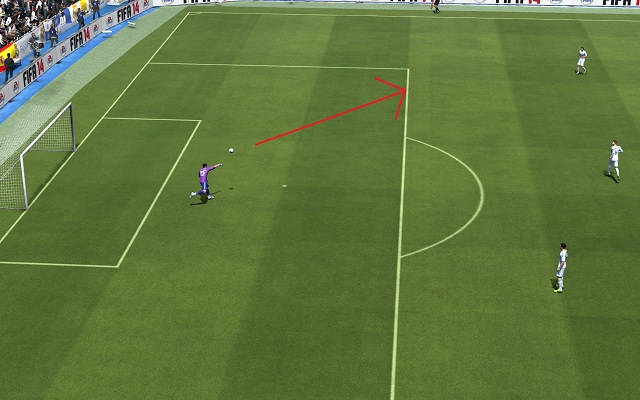
Throwing the ball is the easiest way of resuming the game and passing the ball to nearby players. It's also a good way of beginning a fast counter attack by throwing the ball to a running player. In order to resume the game with a throw, press the pass button and point the direction and strength with which the ball will be thrown.
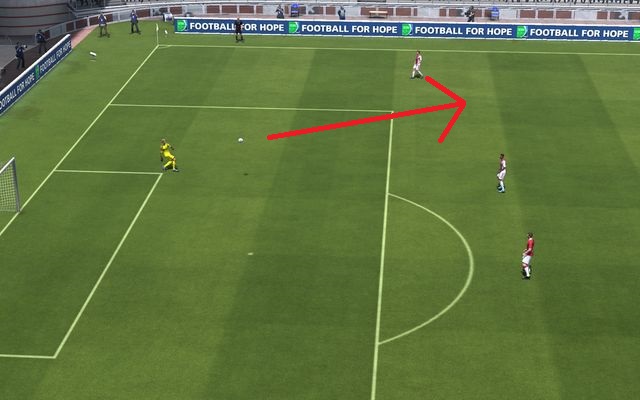
A long shot is the most popular and at the same time the easiest way of resuming the game and quickly moving the focus onto the enemy's side. A well played ball and a won battle in the air can get you a chance of a fast and surprising attack. In order to shoot out the ball, press the drop kick button and fill the strength meter depending on how far you want to kick the ball.
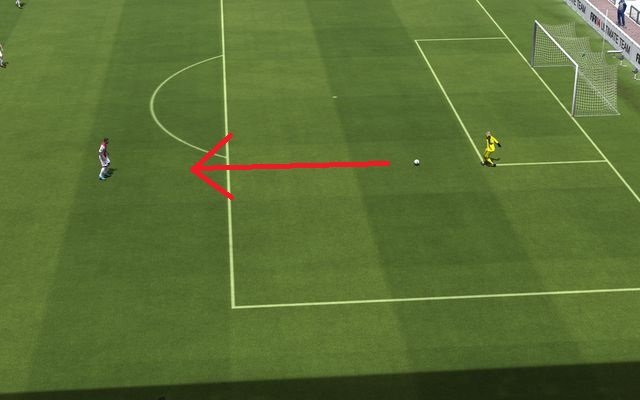
Resuming the game with a pass is the easiest way of passing the ball to the player closest to the goalkeeper and at the same time making sure that the ball doesn't end up in the enemy's possession after a lost header fight. In order to resume the game with a short past, press the pass button and choose the direction in which you want to send the ball. Look out for enemies charging from behind the player to whom you're passing.
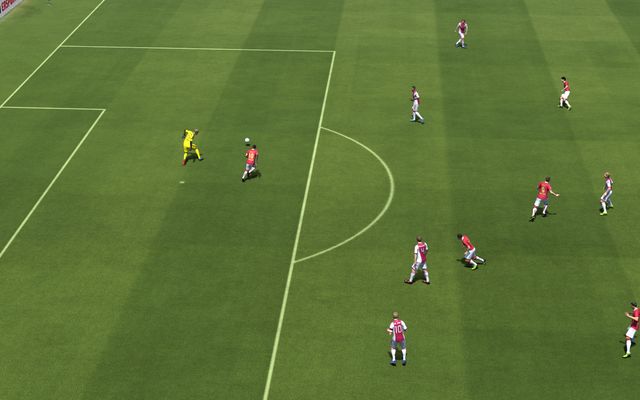
Sometimes the situation will require you to pass the ball back to the goalkeeper because of a lack of other possibilities. When you do, you have to make sure to kick it out as fast as possible. Of course the easiest solution here would be passing to a nearby player, but remember that goalkeepers usually aren't great in terms of technique and even the simplest pass can cause them some trouble, especially under enemy pressure. Don't risk losing the ball - in dangerous situations, just kick the ball out of the field to give your teammates time to regroup.
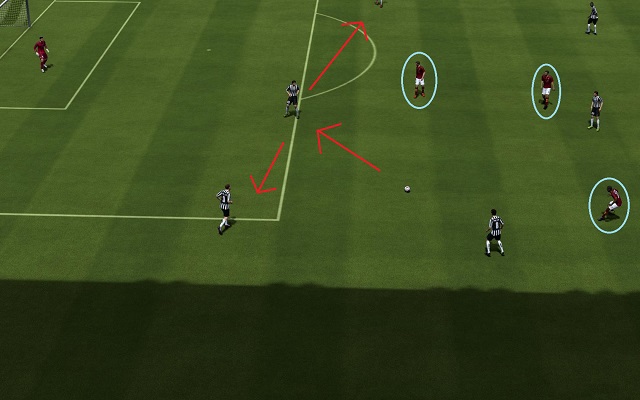
A good positional play starts, first of all, with a creative and sober-minded playing the ball in the defensive line. In case of no options to play the ball towards the opponent's half, try to exchange several passes between your defenders - sooner or later this will draw the opponent's attention, who will be more and more encouraged to leave their positions and moving towards the goal, which will create a few additional variants to play the ball. Try then, to play a long pass perpendicular to the forwarding opponents or pass the ball to the playmaker, who will be able to extend the attack to wings or towards the penalty field.
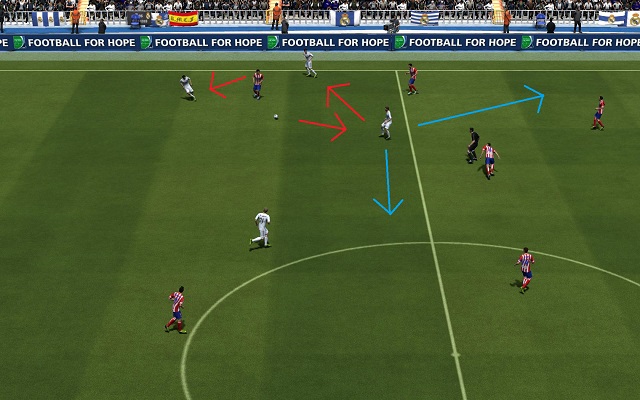
1-2 passing in a small area is one of the best and, at the same time, immensely flashy way to confuse the opponents trying to seize the ball. Playing the bal in a small area requires you to make decisions quickly and, above all, a good idea about what should follow. Try to exchange short, swift passes (red arrows) between players within short distance, and eliminate, at the same time, those of the flayers from the defensive play, who do not follow your actions anymore and start roaming. After you have exchanged several passes, try to use the available options and variants to play the ball (blue arrows), which often create an opportunity to launch an interesting attack along the wings.
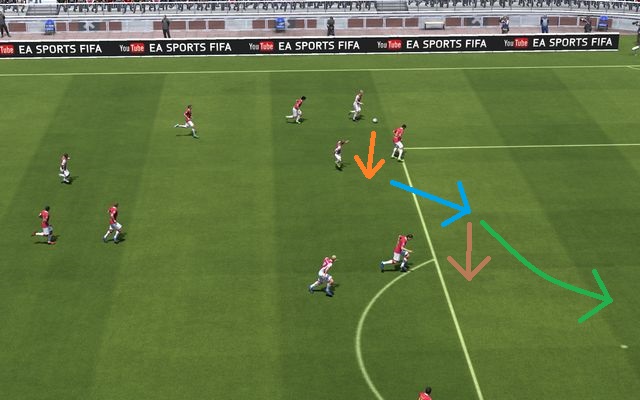
A well played ball in the penalty area is the basic of a good final attack. A very effective tactic here is using short passes right next to the penalty zone - a short pass to the closest player (orange arrow) gives you a chance of quickly running into the penalty (blue arrow) and at least two possibilities afterwards - you can play the ball to the player below, giving him an almost perfect opportunity of scoring a goal (brow arrow) or finish it yourself with a low shot into the corner of the goal (green arrow).
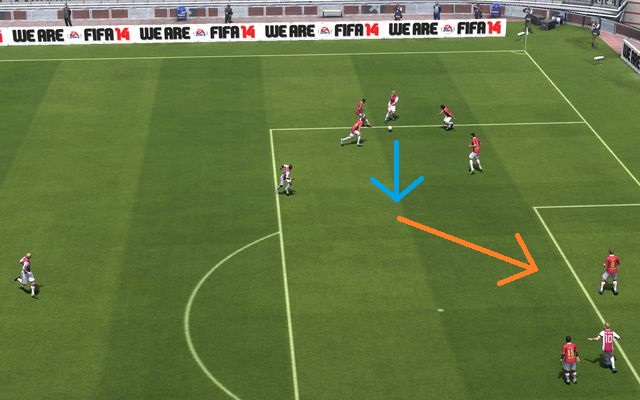
Drawing the defenders' attention and focusing it on a single player gives you multiple possibilities of playing the ball and can open a straight way to scoring a goal. As you can see in the above screenshot, the player passing the ball gained the attention of as much as 4 enemies, who left the other two players running into the penalty uncovered. A straight pass into the middle of the penalty (blue arrow) gives you a chance if a fast shot from a small distance (orange arrow). It's also a good idea to extend the pass and play the ball to the further player.
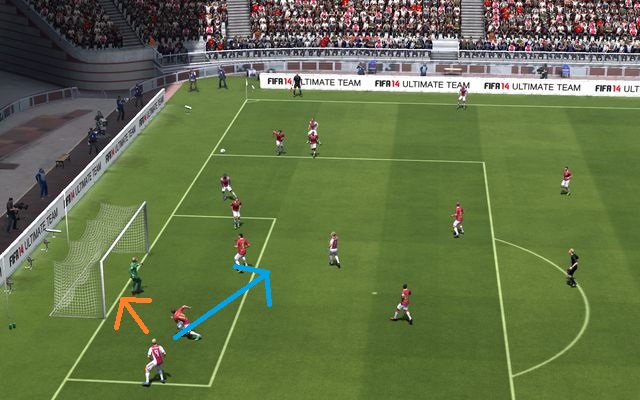
Playing the ball to the "far post" is a very specific action - the ball has to be passed so that it doesn't end up in the enemy goalkeeper's range. If it comes down to it, you usually have two options - you either hit straight at the goalpost (orange arrow) or pass the ball to a teammate in the penalty area (blue arrow) and try to shoot the ball from as close as possible.
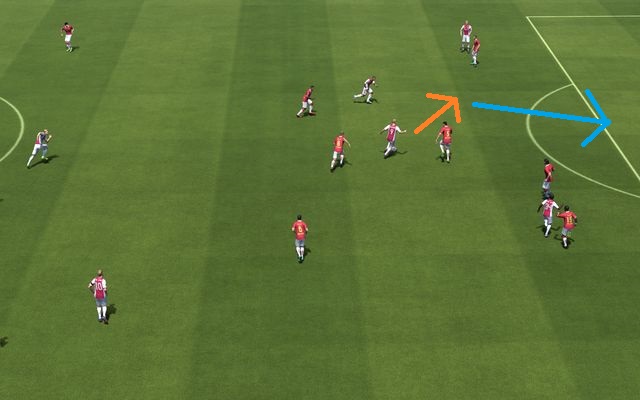
Disorganizing the enemy's defence is a basic thing to do when you want to finish your action. Quite often everything comes down a single well passed ball, matching the pace and giving the player a clear shot. Playing a ball to an empty area (orange arrow) in many cases can give your player more space which he can immediately use by charging into the penalty zone and shooting at the goalpost (blue arrow).
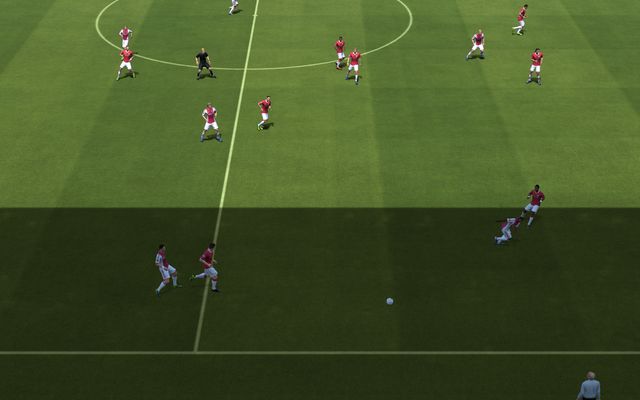
Effectively using the flanks is very often the basis of success in a given match and a possibility of surprising the enemy with an uncommon action using holes in the defence. Enemies often tend to leave an empty area at the very sides of the field, so you should effectively use that chance and often use that part of the field to your advantage. Of course the basic way of using the speed of wingmen would be an accurate short pass and an early start of the wingman which can give you a few seconds of advantage and the possibility of playing the ball into the penalty zone.
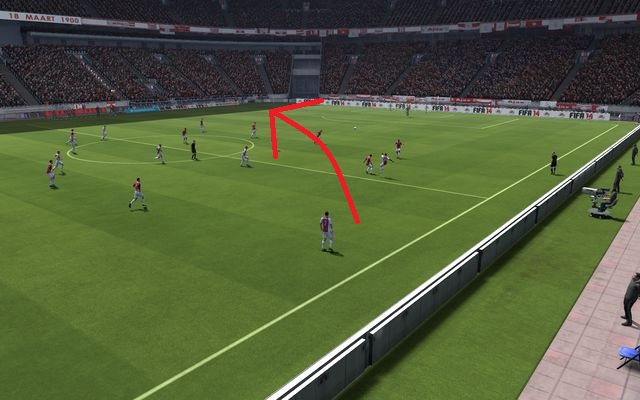
A great way of using the width of the field is a quick lob to the other side - it's difficult and requires much precision, but at the same tame it lets you easily surprise the enemy' defence. A well addressed ball not only opens free space on the other side of the field, but also lets your attacker reach a clear position and pass the ball to an incoming teammate. Despite it being a very difficult pass to receive, a successful attempt can lead to a very simple and yet highly effective offensive action.
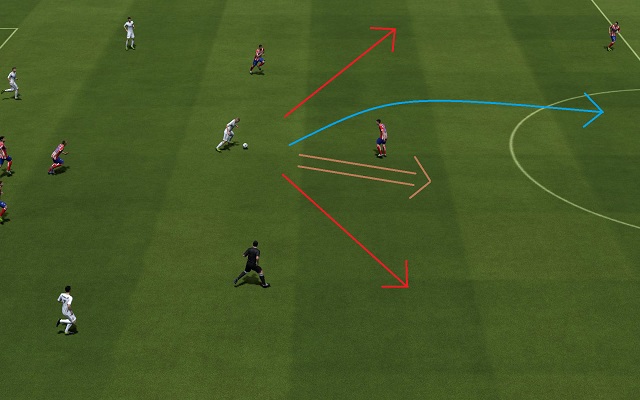
The key to success in the case of virtually each counter-attack, lies in extracting the bal from the line of defense in front of your goal and play the pass opening the variant of playing the ball, of your choice. The greatest number of ways to surprise the enemy is provided by playing the bal along the middle of the field - this gives you the opportunity to lead the ball into the furthest distance (brown arrow), allowed by the retreating defenders. There also is an option to play the ball to the wings (red arrows) or to pass the ball to the forwarding striker (blue arrow). The way of playing the ball depends only on your idea on the attack.
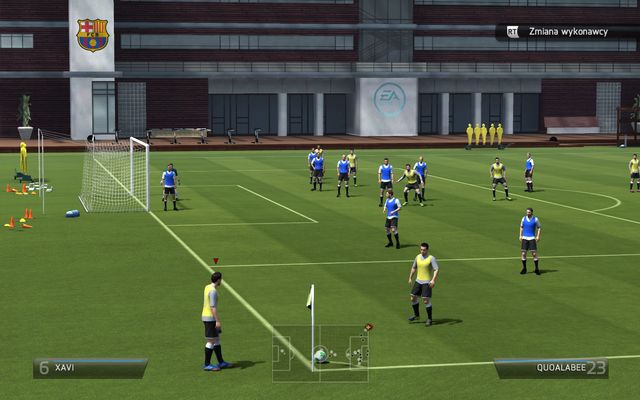
In order to change the corner executioner, press R2 (RT, Shift) and choose a different player from the list. Pay attention to the skills of given players.
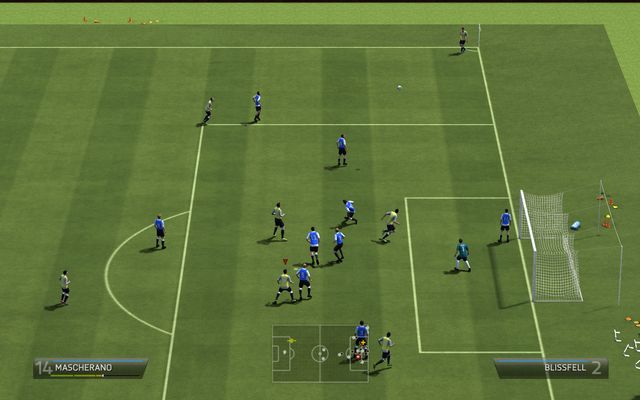
A classic corner doesn't require too much effort - the most important factors are choosing the right direction and strength with which you want to kick the ball. In order to perform a classic corner, press the throw in/cross button. It's a good idea to play the ball towards the sixteenth meter - usually there's a lonely player there who can perform a clean and strong shot.
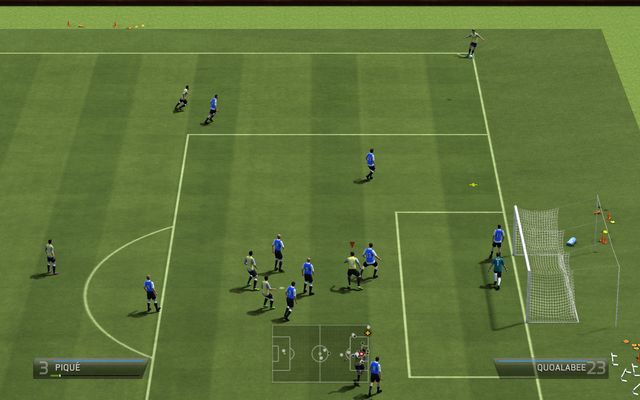
A low cross can be useful to play the ball to the near post towards an incoming player who can try to surprise the enemy goalkeeper with a sharp angle shot. To perform a low cross, press the throw in/cross button twice.
A ground cross can be done when you're sure that the player who you pass the ball to is in a straight line from you, with no enemy able to intercept the ball. In order to perform a ground cross, press the throw in/cross button three times.
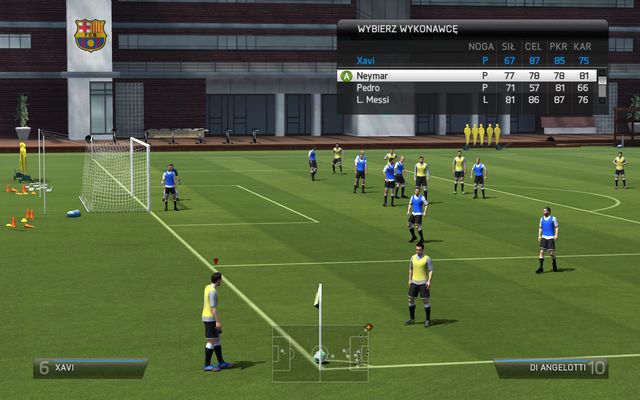
A simple pass is a good option when you don't want to shoot another goal, but rather keep the score at the current level - after passing the ball to the nearest player you can try keeping the ball in the corner or pass it to the back, trying to draw enemies away from your side of the field. In order to call in a player, press the run button.
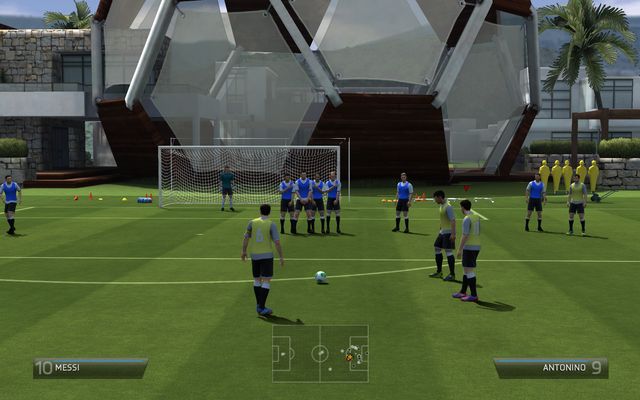
FIFA 14 allow for combinations when executing free kicks with as much as three players. In order to use their skills is this set piece, you can add a second - the run button - and a third player - the finesse button.
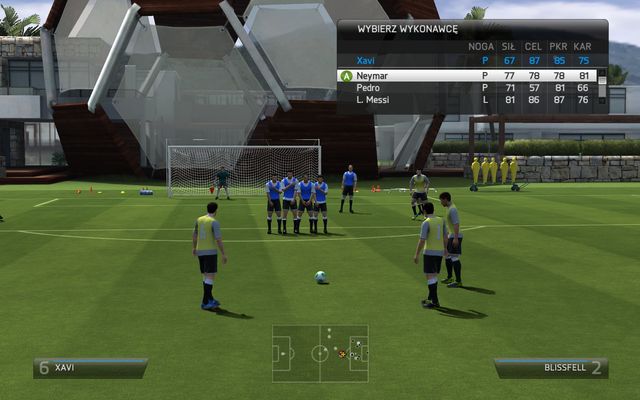
You can change the free kick executioner by pressing the sprint button.
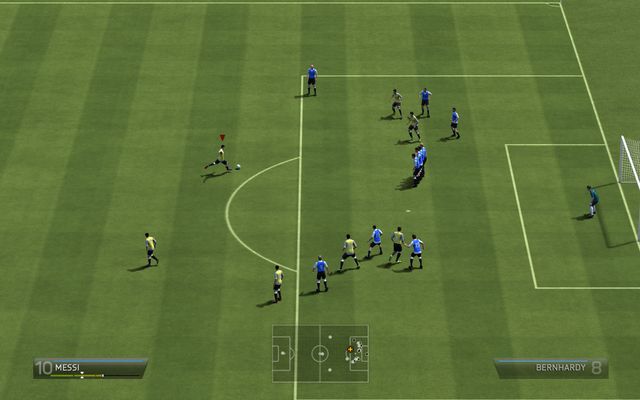
It's the simplest but also the most effective way of scoring a goal from a free kick. In order to shoot at the goalpost, press the modifier and shoot button. Try matching the power with which you want to kick the ball. Try choosing the upper corners of the goalpost - it's hardest for the goalkeeper to catch the ball there.
A technical free kick is a good choice for player with good technique. This type is good for free kicks maximally 20 meters away from the goalpost. In order to perform such a shot, press the shoot and finesse modifier buttons.
Sending a "torpedo" at the goalpost from afar is the domain of strong and athletic players. Such a shot are good from big distances, when the most important thing is not necessarily precision, but the sole power which can cause problems to the enemy goalkeeper. In order to send a straight torpedo, press the shoot, modifier and finesse buttons.
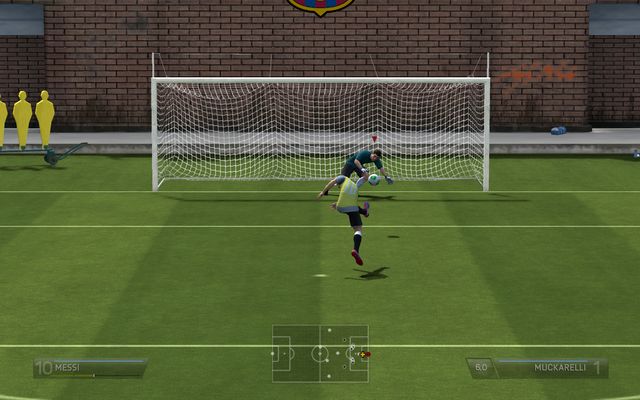
The easiest way of using a penalty is of course a strong kick into one of the corners. In order to shoot at the enemy goalpost, press the shoot button while making sure that the marked ends up as close to the green field in the lower left corner as possible. Try shooting possibly close to the post and as strong as possible - even if the goalkeeper predicts what you want to do, a strong shot will be much harder to defend.
A finesse penalty is delicate, but at the same time very precise and with the proper rotation it can spectacularly avoid the goalkeeper's glove. Such a shot is particularly effective when you try to shoot the ball at one of the upper corners. To perform such a shot, press the finesse and shot button.
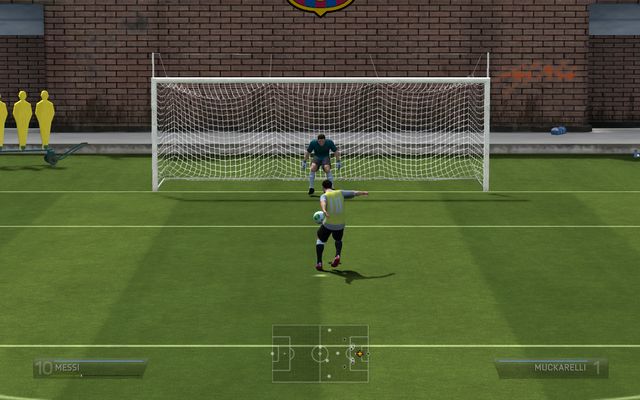
An Antonin Panenka inspired penalty shot is a great way to humiliate your enemy by fooling him into jumping into one corner, while you calmly shoot right in the middle. In order to perform a chip shot, press the modifier and shot buttons. Remember that it's a very risky technique, but at the same time very spectacular.
Feinting when running to the ball is a great way of tricking the goalkeeper - as your player runs, he suddenly stops for a moment, takes another look and then shoots the ball. In order to feint, press the shot button when running.
If you want to change the player performing the penalty, press the sprint button. You can change anytime before beginning the run-up. Remember that you can't change the player during a penalty shoot-out where the order is set.
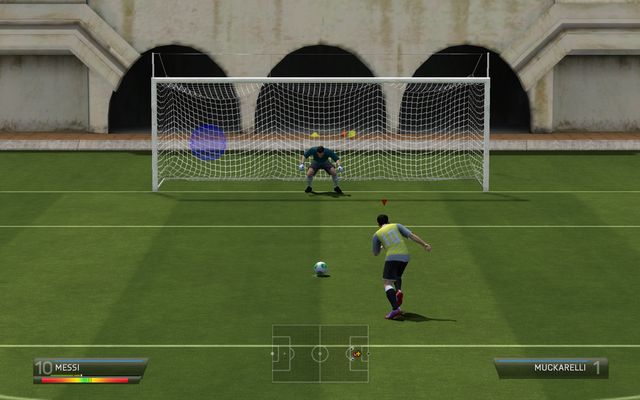
Less experienced players are sure to gladly welcome the option of using a sight which shows you the exact place where the ball will fly. In order to use the sight, press the pace button.
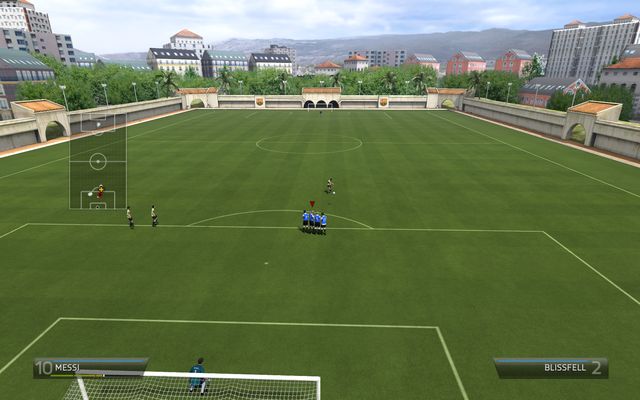
Moving the wall is the basic way of defending a free kick and helping your goalkeeper. Using it you can better cover and secure the free space in the goal and make a successful intervention much easier. In order to move the wall, press L2 + R2 (LT + RT, MMB + Left Ctrl).
Decreasing the distance between the player and the wall made by the members of you team is a good way of making it harder for the enemy to score a goal. You however have to do it discretely, as each bigger move will be rewarded with a card for one of the players. To move the wall to the enemy, press R1 (RB, D).
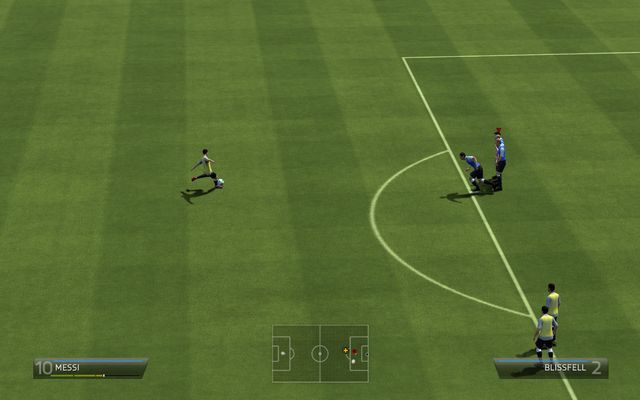
Charging out of the wall gives you a chance of disorienting your enemy and taking away his chance of scoring a goal. In order to run out of the wall when the enemy starts charging at the ball, press the pass button.
If you think there aren't enough players in the wall, you can always increase the size of the natural barrier - for that, press the trigger button. Keep in mind that the bigger the wall is, the fewer players can cover enemies found in the penalty area or in line of the shot.
FIFA 14 has a much easier way of performing tricks than previous installments in the series, as some of them have been moved to the right analog stick, making it much easier to avoid enemies in this very effective way. Below you will find the most popular and interesting tricks together with instructions how to perform them.
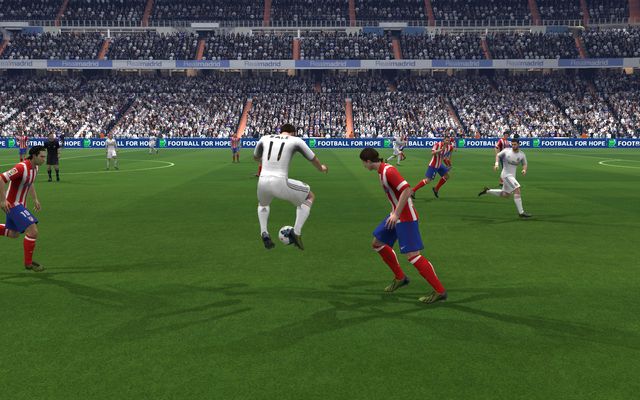
Elastico - a great way of tricking the enemy and suddenly changing the direction you're running. To perform it, move the analog stick right and afterwards left along its lower perimeter.
Roulette right - a very spectacular trick which often lets you watch a replay including it. To perform it, move the analog down and move along 3 of the perimeter, counter-clockwise.
Roulette left - just like above - to perform it, move the analog down and move along 3 of the perimeter, clockwise.
Ball roll left - it's a trick used mostly to dodge an enemy's attempt to take over the ball possession. To perform it, move the analog stick left.
Ball roll right - just like above - to perform it, move the analog stick right.
Heel flick - a spectacular way of lobbing the ball over a disoriented enemy and continuing your action while leaving the enemy behind. To perform it, move the analog stick up and then quickly down.
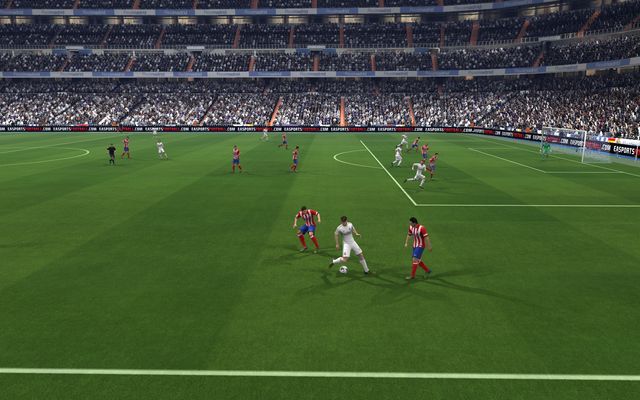
Rabona - an extremely effective trick. To perform it, press the following combination: pace control and throw in, followed by: pass and left analog stick down.
Sombrero - a wonderful trick which lets you bounce off the ball with your back in the direction opposite to the one you're running at. To perform it, hold the left analog stick and choose the direction in which you want bounce off the ball which is flying towards you.
Around the world - a trick which can be performed only when juggling the ball (hold down the pace control button and press the finesse modifier button), consisting of moving your leg around a bouncing ball. To perform it, perform a complete turn with the right analog stick.
Celebrations are the best way of showing your happiness after scoring a goal. FIFA 14 includes a few dozen different options of free celebrations. Below you will find some of the more interesting propositions:
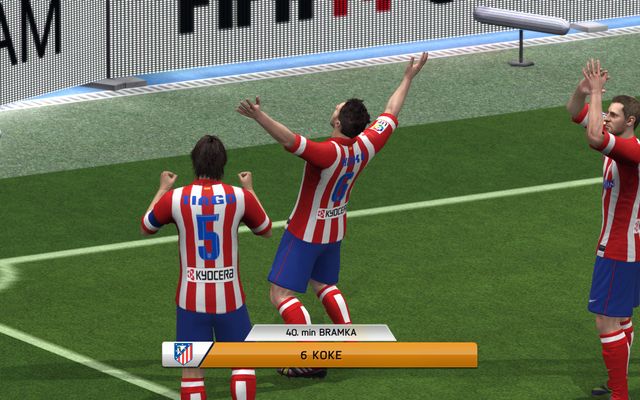
Bottom dance - One of the most attractive ways to celebrate a goal in the south American style. To perform it, press the modifier and double press the tackle slide/throw in button.
Shone shine - polishing the shoes of the one who scored is a great way of showing respect. To perform it, press the pace control button and the shot button.
Standing and pointing to sky - a celebration used mostly by Brazilian and Argentinean players. To perform it, press and hold the pace control button and the shot button.
Double back flip - an option for fit players to boast their skills after scoring a goal. To perform it, press the modifier button and turn the analog stick right.
Violinist - players with weakness towards classical music can use this celebration. To perform it, press the pace control and the throw in buttons at the same time.
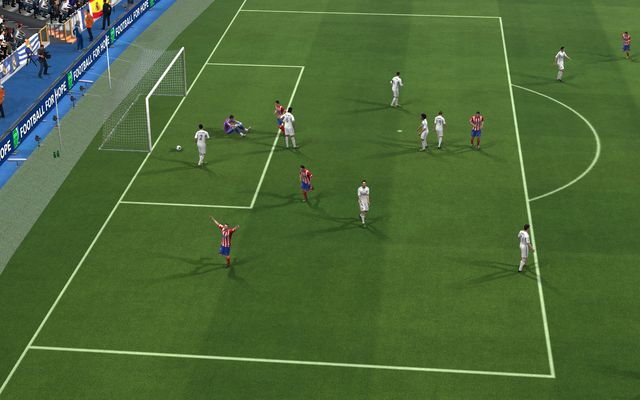
Spanish archer - an option for fans of athletes and Usain Bolt - it is, after all, his trademark. To perform it, press and hold the pace control button and at the same time push the perpendicular pass/goalkeeper charge button.
Ai Se Eu Te Pego - a celebration in the rhythm of the well known Brazilian music hit. To perform it, press the sprint button and the right analog stick at the same time.
Why always me - a celebration referring to the famous "Why Always Me?" t-shirt wore by Mario Balotelli, at that time playing in Manchester City. To perform it, press finesse modification button and double press the perpendicular pass/goalkeeper charge button.
Cradle swing - a classic way of celebrating a goal when your teammate is having a baby. To perform it, hold down the sprint button and press the perpendicular pass/goalkeeper charge button.
The salute - players who like military customs might salute towards the crowd. To perform it, press the finesse modifier and the perpendicular pass/goalkeeper charge buttons at the same time.
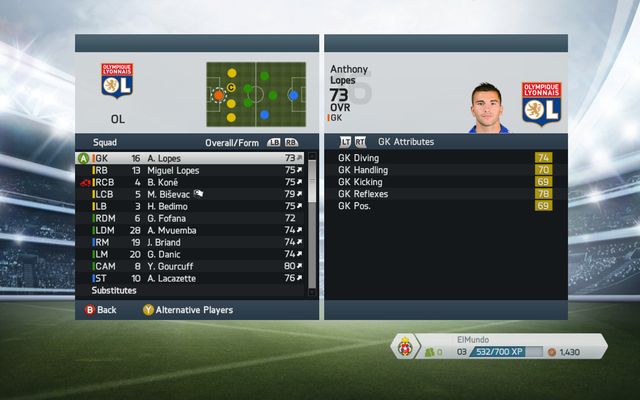
You can set the basic team which will appear on the field at the start of the match and also the ones that will wait in line on the bench, ready to change the ones which don't fulfill your expectations on the field or fit your strategy during the marc. Of course the main factors deciding whether or not a given player is usable is whether he's suitable for a given position and his stats. You can't forget about other factors that decide who is best for a given role - stoppers should have good strength and jumping, with wingers sprint speed and agility are important, while a good attacker should have great acceleration and reactions.
When choosing the reserve bench, remember about taking players of each type, including a spare goalkeeper - you need to ensure yourself a wide choice and flexibility. You should also consider taking young players to the game, even if their role eventually limits to the reserve bench. It gives them a chance of earning experience which will help in their development.
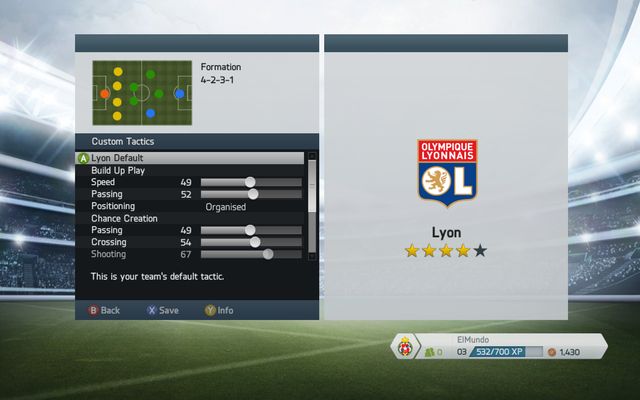
The choice of a formation depends on multiple factors, but mostly on your staff, strength of the enemy and the score which you plan on achieving in a given game.
Focusing on defence is not only about setting as many defenders as possible, but also - or even mostly - effectively using defensive midfielders which will help you in controlling the middle of the field and at the same time strengthen the line of defence when needed. The best options here would be 3-5-2, 4-5-1, 5-4-1 and 4-2-3-1.
Focusing on offence is mostly about using the flanks and good cooperation between midfielders and attackers. Above all, you should adjust your offensive tactic to the defensive potential of the enemy and the number of attackers ready to play at your disposal. The best offensive formations would be 4-4-2 (diamond), 3-4-3, 4-2-4 and 4-2-1-3.

The tactic panel lets you define a few important factors from the point of view of how actions are lead out - using it you can set the offensive orientation on ending attacks in various ways, preferences as to whether attack in the middle or using the flanks, stick to the ball or quickly pass it on. It's also a way of forcing pressure, discipline when forcing offsides and how high the defensive formation should stand.
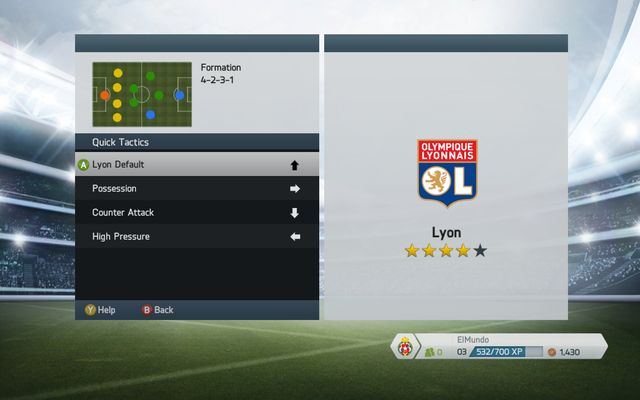
Quick tactics let you assign specific options of dynamic play to given buttons - using it you can arrange your tactics, both defensive and offensive, to different buttons and self-prepared combination.
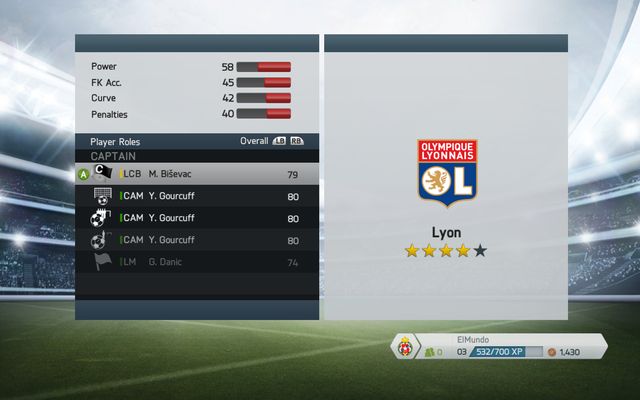
The player role menu lets you assign set pieces to given players - that way you can choose who should perform corners, free shots and throw-ins. You can also set the team captain here.
Manager career is definitely the longest and most complex offline gaming mode. You take on the role of a manager responsible for organizing the team and its results, you take a path through a dozen seasons of professional career, facing multiple challenges and events which can have positive or negative influence on your final success.
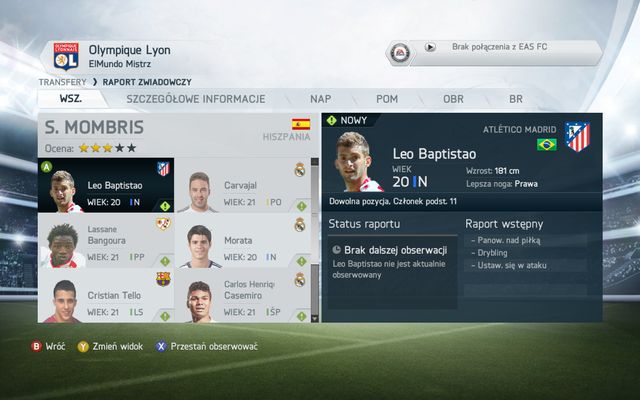
You begin the manager career by choosing the proper option in the menu - we will cover the player career in a different part of the guide.
The next step is deciding on a club which you will manage. Your choice doesn't limit you to only that club - the life of a trainer and manager isn't light, so you will often stand before a choice of changing the team because of weak results or to try leading a stronger club.
The next screen lets you decide on the basic setting regarding the manager mode - you choose the difficulty level and the length of matches. You also choose the financial discipline and the currency in which you will make your transaction. It also lets you switch on or off the European cups and the first summer transfer window.
This screen lets you choose the personality of your virtual manager. Enter your name and surname, choose a nationality, the style and colour of the clothes you wear and basic parameters regarding your looks. Afterwards wait for the manager to be created and begins working in the club you chose.
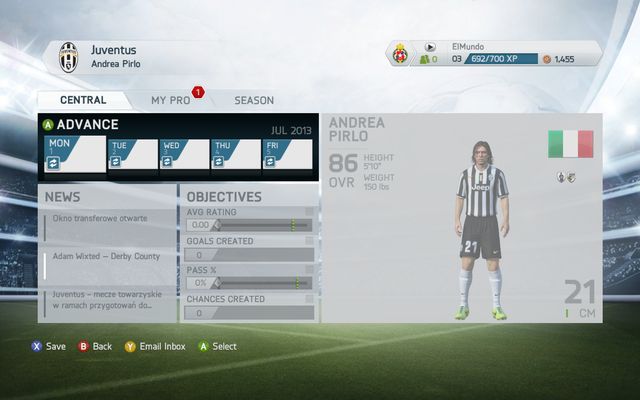
That way you will reach the hub, i.e. the main manager menu which lets you access all functions and tools which we will cover in further parts of this chapter.
The squad menu lets you manage all the players in your team. Using it, you can choose the basic eleven players, formation and tactics for a given match. It also lets you allocate players to given roles on the field and view the current reports on the condition, concentration and morale. Detailed information on choosing the team, formation and player roles can be found in the "Tactics" chapter.
FIFA 14 introduces a big change in the style of conducting transfers - the "Global Transfer Network" is a tool which greatly remodelled the way you buy and sell players.
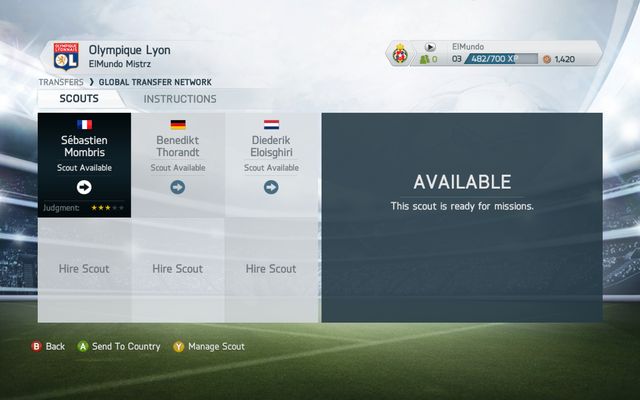
From now on the basic of your activity on the transfer market is scouting - using it you can find players which match your requirements. Scouts let you create a list of players potentially in the field of your interest.
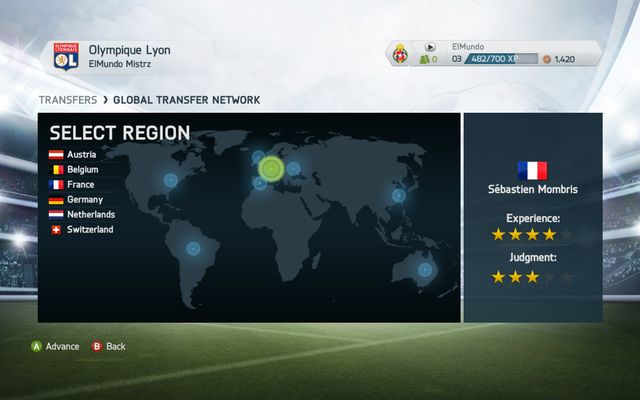
Talent hunters can be sent to multiple available regions - each one can be specified by choosing a desired country and league in which you want to search for players who could strengthen your team.
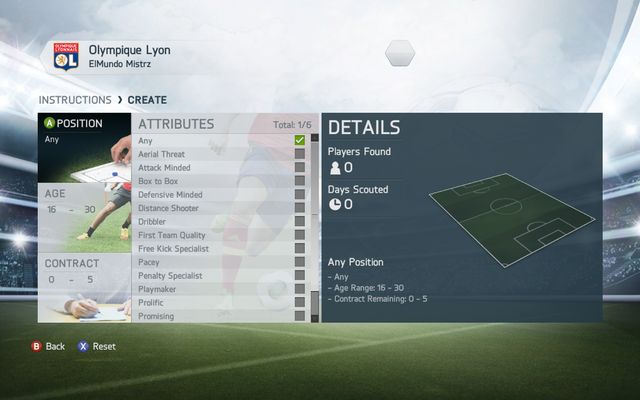
The next step is specifying factors on which the scouts should focus during their searches - you have to specify the position for which you're looking for a player, the age and preferred length of the contract. It's also a chance of picking up maximally six attributes which further specify the nature and specific of the player - there are several dozen attributes available, so you have plenty to choose from.

After a few weeks of efforts, you scouts will present you a full list of players who meet the criteria - as you can see, you still haven't received any detailed information regarding any of them. Statistics and deeper information on the players can be obtained after longer observations and more in-depth analysis of potential.
Of course you can still search for players in a classic way, by defining such basic parameters like role, position, league and age. It's also a chance of finding a specific player by inputting a name in the search window. This time it's a bit more difficult, as you won't find an overall numerical factor which usually was decisive when choosing a player.
Remember that if you're just beginning to manage your club, you might want to focus on players without a current club, so that you don't have to pay any compensation - it's not rare to find players better than the occupied ones too. It's worth focusing on young players who hold promises for the future - after some time, you can make good money on them.
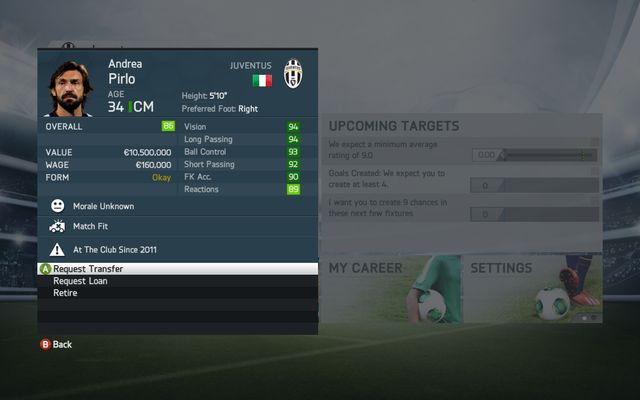
You can gain knowledge on skills and statistics only after assigning a scout to a given player - the longer he spends watching him, the more numbers you will learn. At first you won't be able to know the price - you will receive financial information only if you officially enquire the club in which the player you're interested in plays.
Soon after sending the enquiry, you will receive a reply with the financial expectations of the club - only then will you be able to move to the transfer option and respond to the financial requirements.
A scouting report unveils several mysteries regarding the player you're interested in. The question marks in the summary part of the report will be replaced by concrete numerical values which let you assess the potential of the player. Example skills possessed by the player and his main attributes also appear.
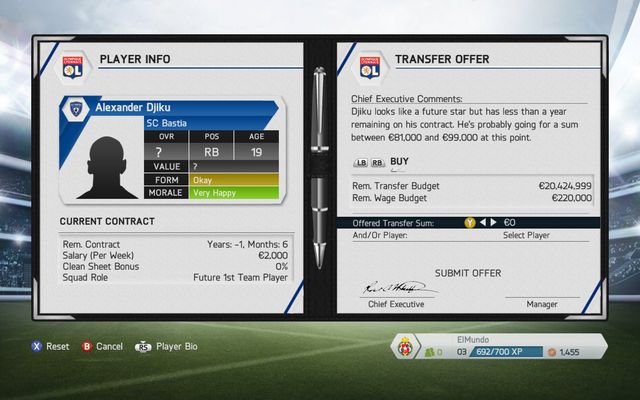
After analysing the player's skills, all you have to do is place an offer and wait for the acceptance - your success at this point depends on your financial possibilities and determination.
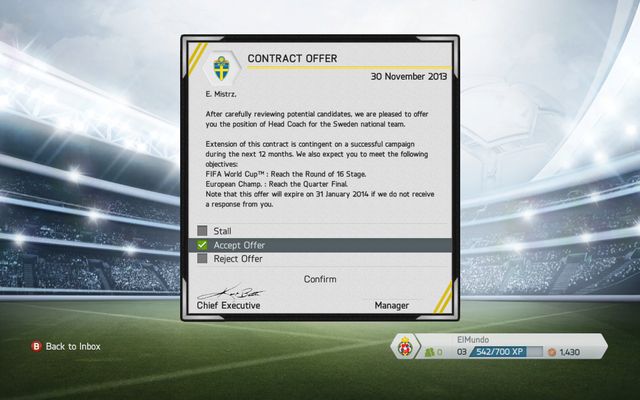
Leading a national team is a large privilege and an honour given only to only the best experts valued in the country or leagues, capable of selecting the best players born in a given country. In FIFA 14, you will receive such an offer after achieving good results with the team you're leading - of course at first you will be contacted by less known countries whose hopes end at reaching a decent place in the world cup elimination. Of course with time you should be contacted by better countries, though the kind of offers that you receive depends solely on the results that you achieve.
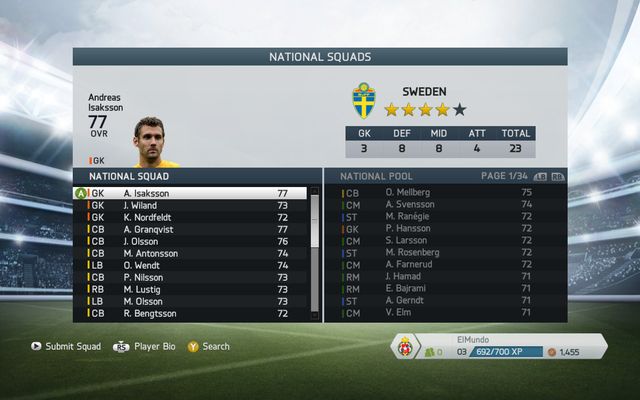
Leading a national team doesn't involve many duties - apart, of course, from playing the interstate matches and trying to meet the requirements set by international federations. You need to select a dozen or so players which you will be using during the games. You have a free choice, while remembering about the fixed number of players for given formations. Remember about diversity, as you cannot appoint more players when one of your basic ones gets injured.
The player career mode lets go through a career lasting a dozen seasons, controlling a player created by you or an existing one and leading him to glory, climbing up the football hierarchy. It's a chance to try your solo skills and a chance of gaining priceless experience of playing as a single player.
Start off by choosing the proper option in the menu - for that, click on the image of Radamel Falcao holding the AS Monaco t-shirt.
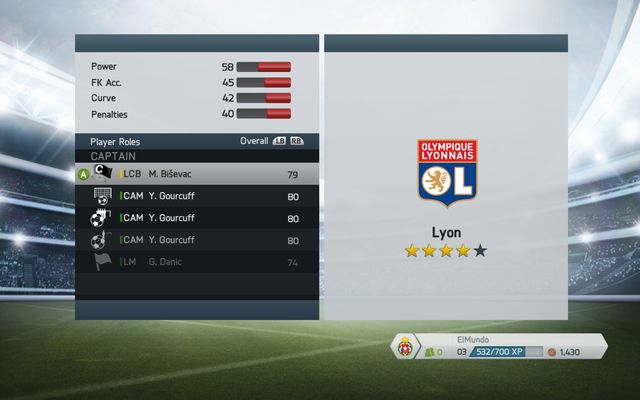
The next step is choosing the team in which you want to play at the beginning of your professional career - for the needs of the guide, it will be Juventus F.C.
Just like in the manager career, this screen lets you choose basic settings - the difficulty level, length of the half, financial discipline of the clubs that we'll be playing for and the currency used for transactions. It also lets you switch on or off the European cups and the first summer transfer window.
There are two types of players that you can choose from - you can create your own player or choose an already existing one and take control of his further fate.
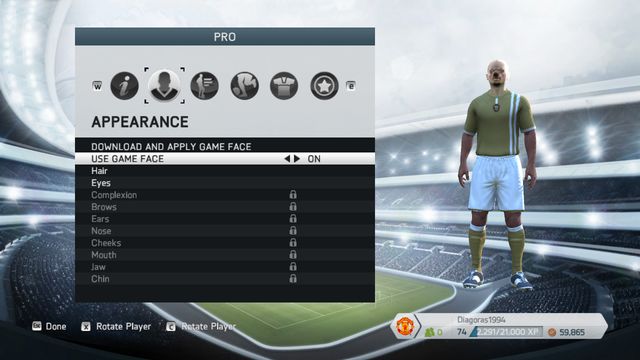
Creating your player avatar takes place in a rather easy creator - using it you can set not only personal data, but also the looks, physical attributes, skills and predispositions for different types of play.
The second option is choosing a player already in the previously selected club - this time we choose the well-known Andrea Pirlo.
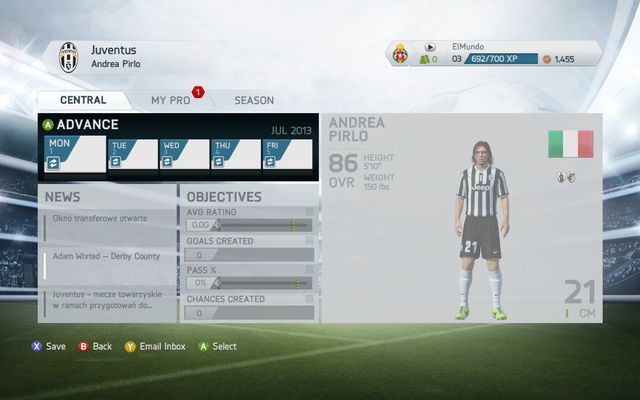
We will begin covering the player career with the main menu known as the "Central" - here you can find a full schedule of your club matches, latest news from the virtual football world and goals set for your player by the club.
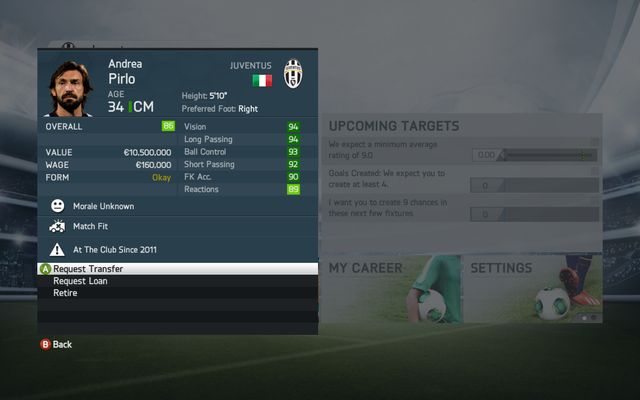
The second menu - "My Pro" - gives you a detailed insight into objectives for the upcoming game and also a look at the key statistics throughout your career. It's a key menu for your player because of the possibility to ask for a transfer or to a different club or to be borrowed, as well as the option to definitely end your football career.
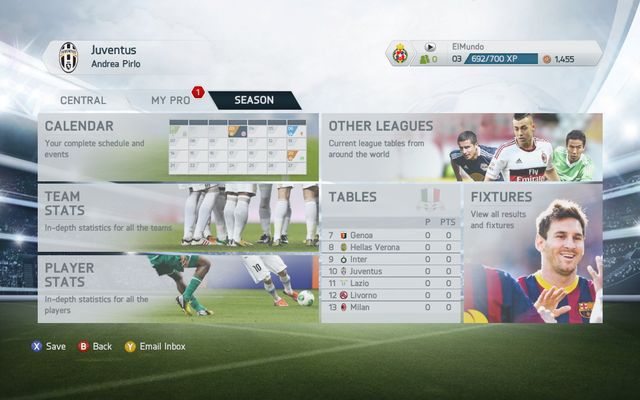
The "Season" panel plays an informative role - it contain series of statistics regarding your player and the whole team, as well as a full schedule of matches.
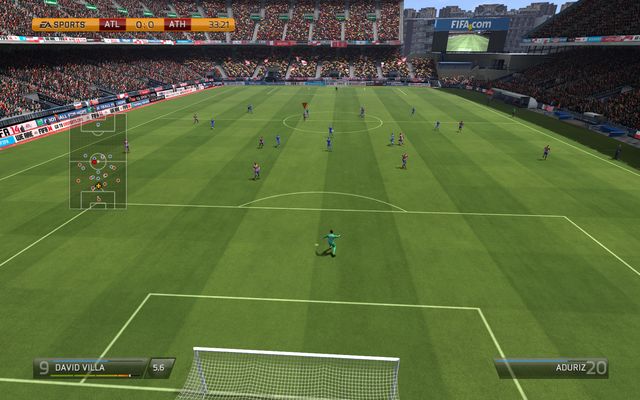
The basic criteria of your usefulness on the field is marked by the grade by the name of your player. It's affected by multiple factors, but one of the main ones is keeping and controlling the position on which you play. The area where you should be is defined by arrows appearing by the mark - the more there are, the further you are from your nominal position and your grade will continue to go down. You should stick to the formation and follow the tactic - otherwise you can prematurely leave the field during the game.
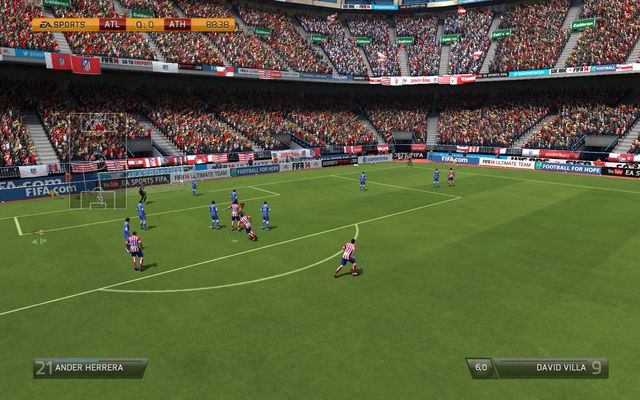
Fighting for the best possible position during free shots or corners is usually associated with pushing your way through the enemy players while looking for a suitable position for taking a shot at the goal, and so it looks in FIFA 14. Before the ball is shot, you have to constantly keep in motion and be sure that the enemy doesn't block you completely - try overtaking him and block him with your own body, depriving him of the possibility of completely covering your player.
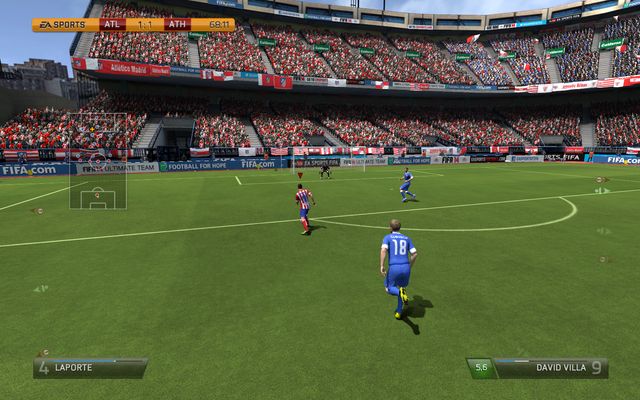
Your main focus on the field depends mostly on what position you're assigned to. If you're an attacker for example, you will get the most point for shooting at the goal and scoring points - that is' after all, the main responsibility of the most forward players. Middlefield player are rewarded for good passes, and considering they're most often on this position, you should keep an eye on their accuracy. The basis of grading a defence player are successful takeovers and interceptions - however keep in mind that each unnecessary foul will lower the overall grade by a few decimals.
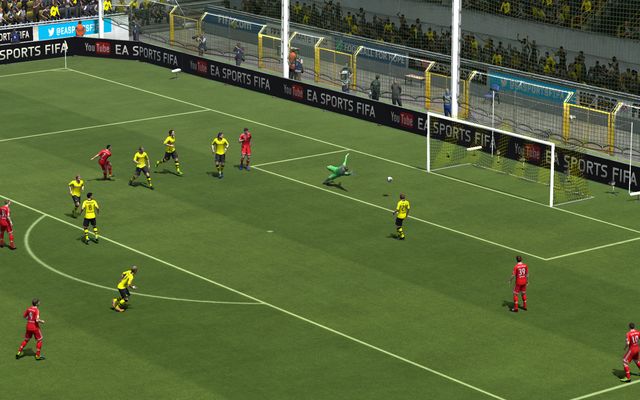
The basis of playing as a goalkeeper and receiving a high grade is of course successful interventions which let your whole team keep a clean sheet. Basic jumps along the goal line can be performed by pushing the pressing button and choosing the direction. Heading out of the goal to stop the enemy attack on your own can be done by pressing the charge button, while pressing the tackle button will cause the goalkeeper to jump underneath an incoming player and collecting the ball before he can make a shot.
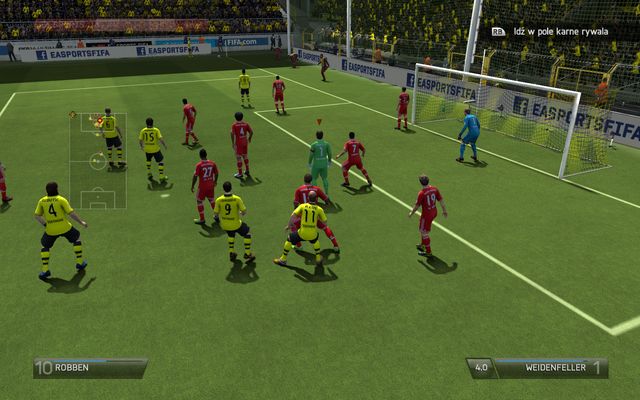
When the match is about to end soon with an unfavorable result for your team and a corner happens to occur, you should try to take the goalkeeper to the other side of the field and back up the other players in the penalty zone. In order to move your goalkeeper to the other side of the field, play the finesse modifier button, trying to fight for a possible best position for your player. In case of a failed attempt to score a goal, return to your position as fast as possible.
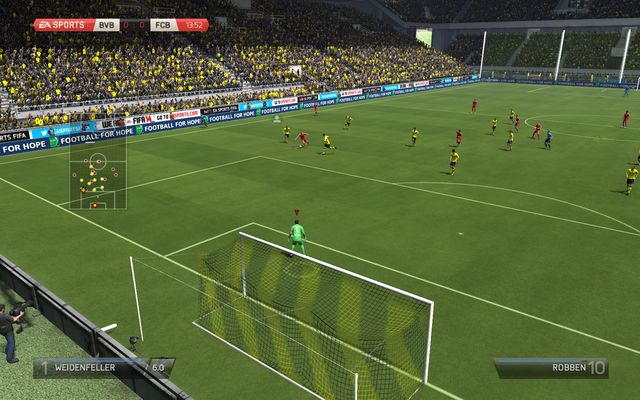
In order to avoid making an easy mistake and remain ready at all times should your enemy try a quick attack, it's worth keeping a ready position just in case. If the goalkeeper is in a proper position, it will be signalled by a round marker appearing when danger occurs - you should follow the game's recommendations as it influences your grade and lets you intervene should you need to.
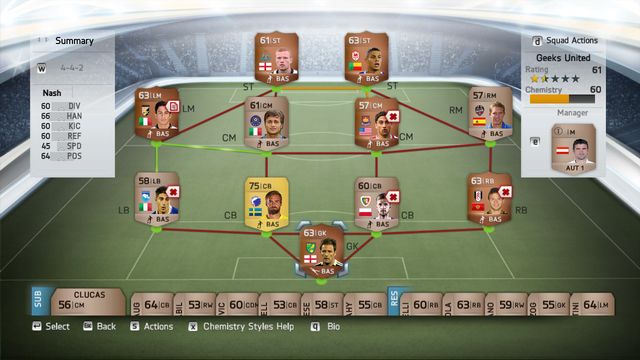
FIFA Ultimate Team is the most popular mode available in the game. Apart from a standard game, it also offers several elements which make the whole more interesting. The most important of these elements is the option to form your own team, which you then will be able to lead to the champion league.
One of the most important tasks ahead of you is to position your players on their nominal positions. Next to the card slots, there are the names of the zones (e.g. CAM, CF or DM), which change depending on the formation. The same markings can be also found on the cards themselves. Each one of the players is matched with a position where he plays best. You can change using special disposable cards. Matching a player with the position in which he plays is depicted with the red dot directly below that player's card. There are the levels of match:
- green corresponds to a perfect match and guarantees the highest possible bonus to teamwork.
- orange corresponds to a position similar to the nominal one. The player receives a lower bonus to teamwork.
- red corresponds to a mismatched position and the player receives no bonus
Then, you should focus on successive increasing of teamwork within the team. The quality of teamwork is reflected by means of lines that connect individual cards. There are three connection-forming parameters, and at least one parameter must be identical fir cards placed in neighboring slots. Just like in the case of the players' positions, teamwork is color-coded:
- green lines refer to the maximum bonus to teamwork. To create such a connection, you need to match two or three parameters. Therefore, it is enough for the players to play for the same team and their league and the club match automatically. It is also permissible to play in different clubs, as long as it is in the same league and country.
- orange lines refer to partial teamwork and you can receive it with, at least, one parameter matched.
- red lines means that there are no bonuses to the teamwork involved and mismatched parameters.
In the upper-left corner of the screen, you can change the mode in which the cards are displayed. This way, all of the information that you need is contained on one screen. Apart from that, there are two more icons to appear on the cards.
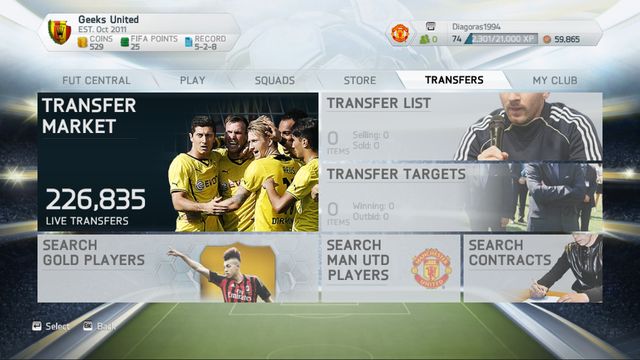
The first one refers to the loyalty bonus and the second one - manager bonus. Unlike the connections and positions in the field, these here may only come in two colors. Green that refers to the bonus being granted, and white when you do not meet the requirements to receive it. All the cards that have been drawn by you in the packs, receive loyalty bonus automatically. To receive this bonus, you need to play, at least, 10 games in your team.
<br>The players of the same nationality as the manager, and who play in the same league, in which the team led by him plays, receive another bonus to teamwork.
In FIFA Ultimate Team there are several types of cards:
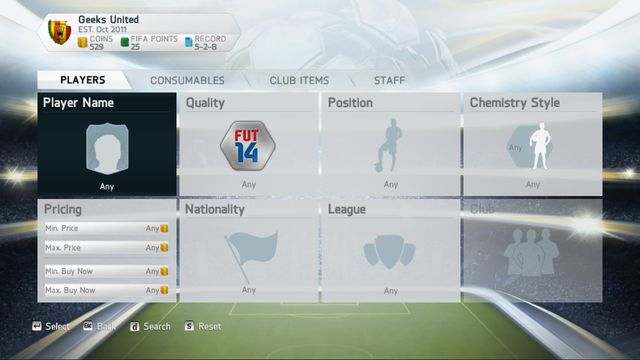
The most popular type of cards is, of course, the cards featuring the players. You can obtain them in packs and in auctions. It is easy to figure out that they have different colors. The basic ones can be brown, silver, and gold but, EA often surprises players with special cards. Then, you can also find orange, blue or purple cards in the packs. Each week, several players make it into, the so called, team of the week, and black cards, called by many the IF (In Form) cards, make it into the deck. All of the colors, different from the basic cards, guarantee that the card is much more expensive in the transfer market. Some of the cards may have gloss, which additionally increases their value even in the case of a quick sale. They are called the rare cards.
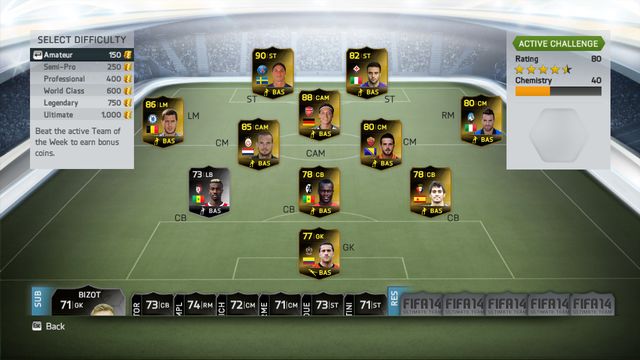
Holding a few types of cards is requisite for the upkeep of the team. In the disposable cards, you can find contracts as well as cards that heal injuries of your players. If your team has run out of steam, you can draw, or purchase a card that can be used to improve on the condition of your team, or of individual players, to the maximum. This type of cards also include the disposable ones that increase the players' skills. Depending on the card, they increase the number of days in which the contract remains effective, the amount of healed injuries and bonuses for skills. In FIFA 14, there have also playing styles been added. This will be described in detail further in this guide.
This type of cards may provide your team with an emblem, stripes and the stadium of your favorite football team. You also have the option to choose the ball type but, all of the changes are optional and they do not provide additional profits.

Some of the cards have a minimal bearing on the characteristics of your players. Such are the employee cards, thanks to which you can add coaches, and physiotherapists to your team. Also here, you can find managers that have bearing on the teamwork within your team. It is worth noting that the managers also require contract renewals.
This year, EA Sports introduced, the so called, chemistry styles to FIFA Ultimate Team. They are closely related to an individual player's teamwork. Each style adds bonuses to the skills and the higher the teamwork, the better they are. If a player has the highest rate of teamwork, then he profits the most from his playing style. There are six categories, with individual styles within them.
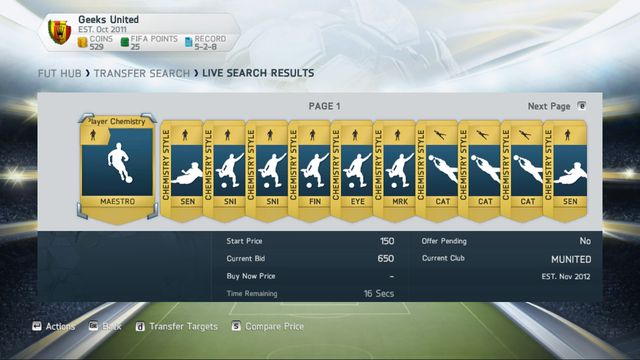
Basic
This style is a default one for all the players. It influences all attributes in a minimal way.
Forwards
Styles from this category improve the shooting skills. There are five such styles in the game: Marksman, hawk, sniper, finisher and deadeye.
Defenders
Styles like: sentinel, anchor, guardian, backbone and gladiator, improve on the skills necessary for good defenders.
Midfield
To create attacks midfielders are going to find artist, architect, powerhouse, maestro and engine helpful.
Goalkeeper
Styles: wall, shield, cat and glove can only be used on goalkeepers. Just like all players in the field, goalies start with the basic style.
Special
Styles from this category are unique sets of skills. In the game, there are three such styles available: hunter, catalyst and shadow.
In the store, you can spend the coins that you have earned, as well as FIFA Points, for card packs. FIFA points is a premium currency which can be bought on the game's official website for the actual money. Depending on what color of cards you need, you choose the item of your interest.
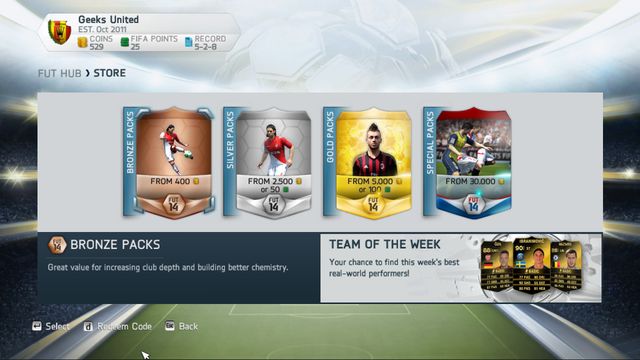
In the brown card packs, there always are 12 cards of various kinds. This, at least, needs to be 10 brown cards including 1 unique, in the case of the cheaper packs and 3 rare in the case of the more expensive ones. This means that you can draw 2 cards of a different color.
Cost: <br>Brown pack: 400 coins
Premium brown pack: 750 coins
The situation is similar in the case of silver packs. You will always find there 12 cards of different kinds. At least 10 silver card including 1 rare for the cheaper pack and 3 rare ones in the more expensive ones. Again, you have a chance of drawing 2 cards of a different color.
Cost: <br>Silver pack: 2500 coins / 50 FIFA Points
Premium silver pack: 3750 coins / 75 FIFA Points
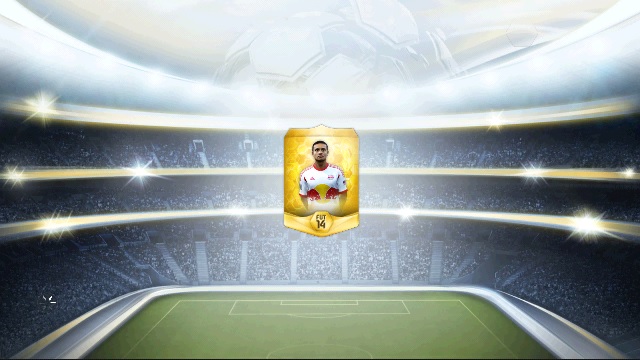
It is, obviously, the gold cards that are the most expensive. While buying them, you can be sure of finding 12 cards of different kinds. The Ultimate Team users have gotten used to the fact that sometimes, during the Happy Hour, EA Sports adds even bigger and more expensive packs where you can find even more rare cards. There also used to be packs with players themselves. Still, the standard is that it is 12 cards a packet, including 1 rare in the cheaper packs and 3 rare cards in the more expensive packs. So, you can also get 2 cards of a different color.
Cost: <br>Gold pack: 5000 coins / 100 FIFA Points
Premium gold pack: 7500 coins / 150 FIFA Points
Hint: By visiting the FIFA Ultimate Team internet app, every day you receive a gift, often in the form of a free card pack.
Thanks to auctions, you can easily form your dream team. If you are looking for a specific player , it is a good idea to make use of a new feature, i.e. search by name. If, on the other hand, you cannot afford popular stars, it is worthwhile to search through leagues and countries to match the players with your team for a relatively small sum and increase teamwork step by step.
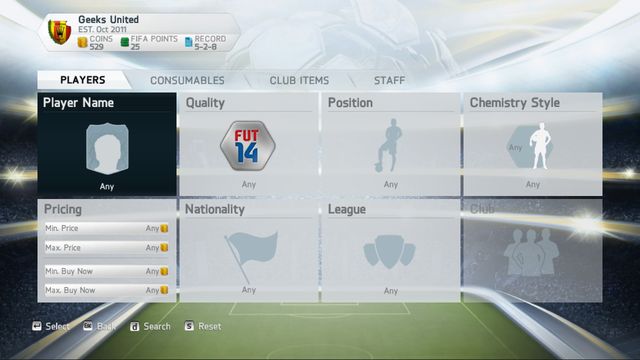
It turns out that the key to form a dream team is money. You can earn it in several ways. For each game that you play, you receive, more or less, 400 coins, even in the case of a loss. Additionally, after the season ends, you receive a larger sum of money, even if you fail to maintain your position in your current league. Another way to raise money are tournaments. For winning in a tournament, you often receive not only money, but also card packs. You can also challenge the team of the week and, depending on the difficulty level that you have chosen, you can receive a bonus of 1000 coins.
<br>In general terms, it pays off to win but, if your condition is currently lower, it is worthwhile to barter basing on the simple rule - "buy cheap and sell dear". It is worthwhile to spend some time to learn about the prices for individual players and hunt for bargains. The more experienced players recommend that you focus on the silver players, due to their lower popularity.
<br>Hint: a regular gold card costs, in a quick sell, at least 300 coins, and a rare card, at least 600If you can find the same card at a lower price, you can be sure that you are going to profit from buying it.
You finally formed a team that you can play a game as. There are several modes to choose from, where you can play with the other players, or with the computer to test your strategy.
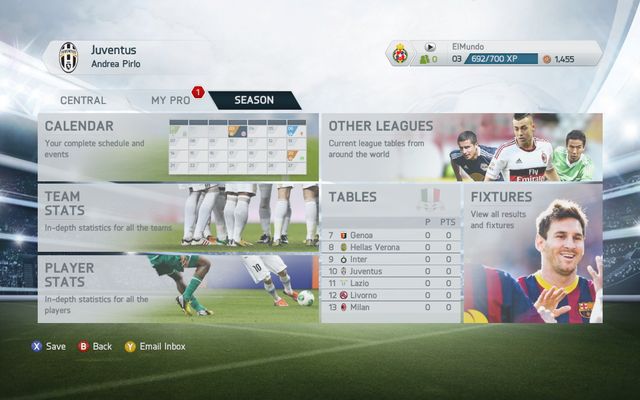
Depending on whether you prefer playing against a "living" opponent, or bots, you select the option that you are interested in. These modes consist in managing your team for 10 consecutive leagues. In each class, there are 10 games for you to play and, depending on the results, you can be promoted, stay in the same league, or be slip down into a lower league. The higher the league, the higher the bonus towards the end of tournaments and the tougher the opponents.
In these modes, you fight in the cup system for a specific prize. Obviously, for each game you play, you receive rewards but, stakes are higher here. In the case of some tournaments, apart from coins, you can also receive card packs as a reward. To join a tournament, you need to meet its requirements, e.g. have only silver players on your team.
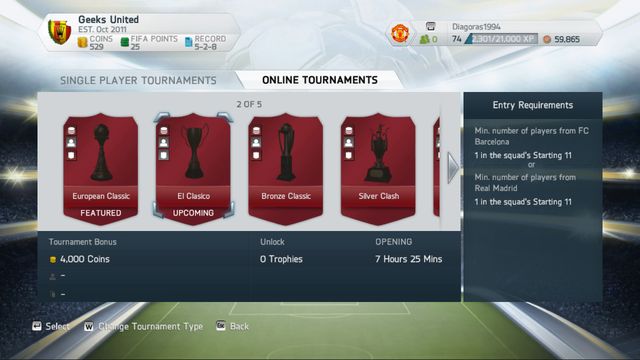
Additionally, you can challenge the team of the week or your friend. In FIFA 14 there also is a "single online match" back, which you can play without worrying about losing your points or being eliminated from the tournament.
The game of the "Virtual clubs", known from the previous installments of the game, is based on a cooperation with the other players. During each game, you have the opportunity to complete challenges, for the fulfillment of which you receive additional skill points. Just like in the other modes, the aim is to get promoted to the first league.
Virtual clubs is an internet based mode that provides you with the opportunity to create your own player, which you can then develop while playing with your friends against the other players. Before you start creating your own player, it is worthwhile to take a closer look at an interesting function in the game. Game Face is an official, free, tool which allows you to generate a three-dimensional face mode basing on a photo.
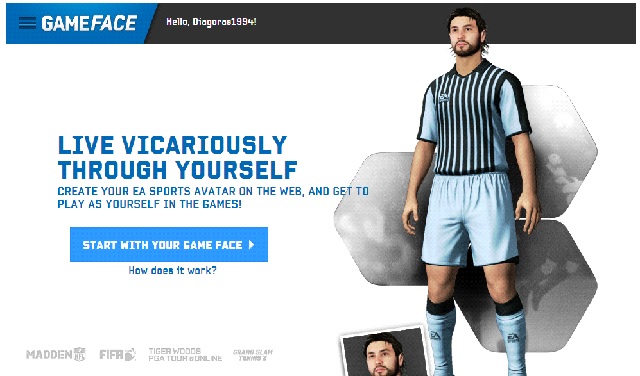
You start by going to http://www.easports.com/gameface and installing the plug-ins required for the proper functioning of the app. Then, click "Start with your game face".
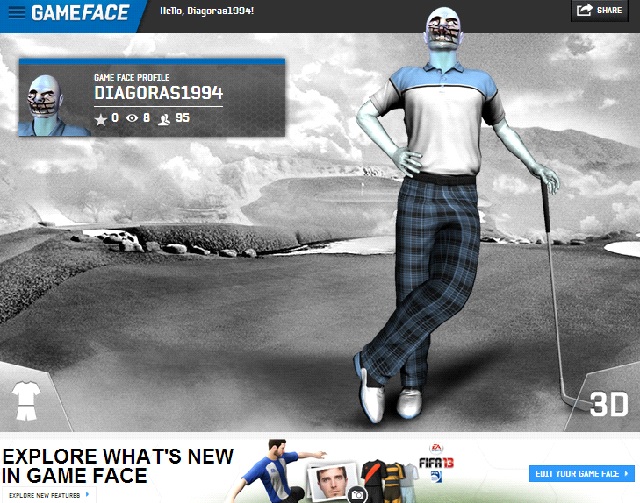
As you can see, the capabilities of the editor are quite vast and it allows you to model the face basing on any picture. Of course, you can play a little trick here and grant your player with a nice smile from an internet meme. It is worth giving a moment's thought to "whom" or "what" you would like to control in the field, and prepare such a face for yourself. Then, click on "Edit your game face" in the bottom left corner of the screen.
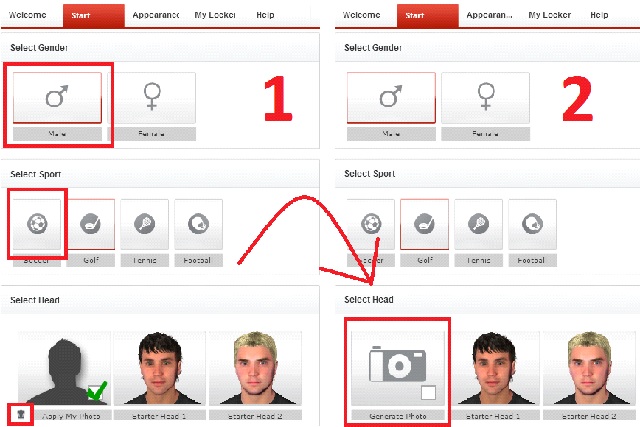
Access the "Start" tab now, choose male and the sport - football. FIFA still does not allow you to play as a woman so, also the Game Face app does not allow you to paste a female face for the game. Once you have created a face, use the trashcan icon to delete it and click on "Generate Photo".
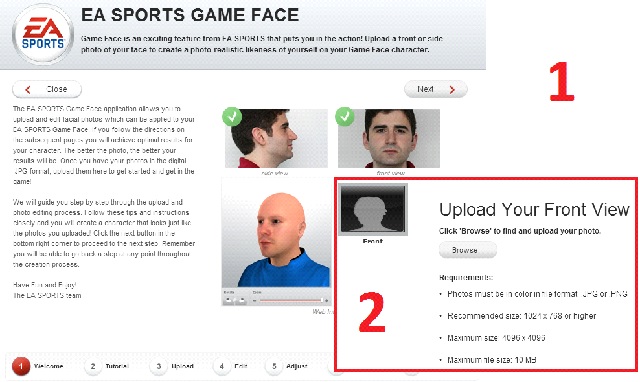
This will make the welcoming screen appear, where you click "Next". Then, you learn what the ideal photo should be. After that, start sending the photo. As an example, I am going to use an "Example Picture" available in Windows 7.
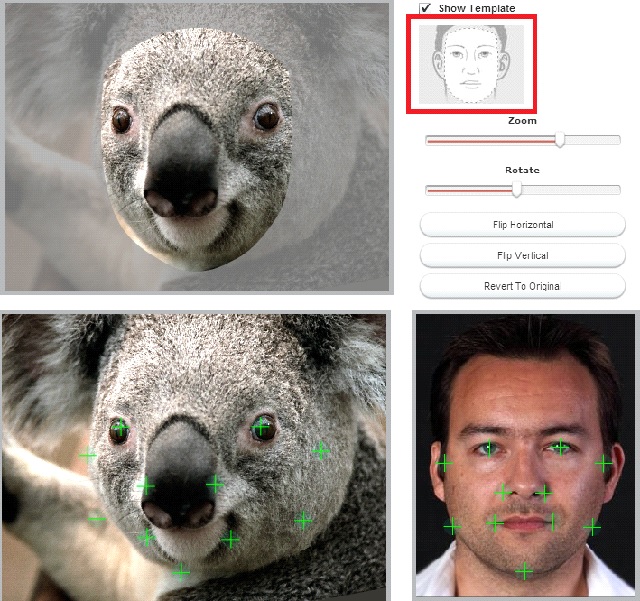
You set the photo, more or less, in accordance with the template and adjust colors. The most crucial element of Game Face is to set the positions for markers. Each one of them refers to a specific point on the human face so, if your picture is the photo of your own face, you need to set it just like in the template. Unfortunately, the koala bear of ours requires a bit more attention. You need to imagine where the markers would be located on the human face and that is where they should be put. Otherwise, the app will send you back here because it will be incapable to generate a model based on markers distributed differently.
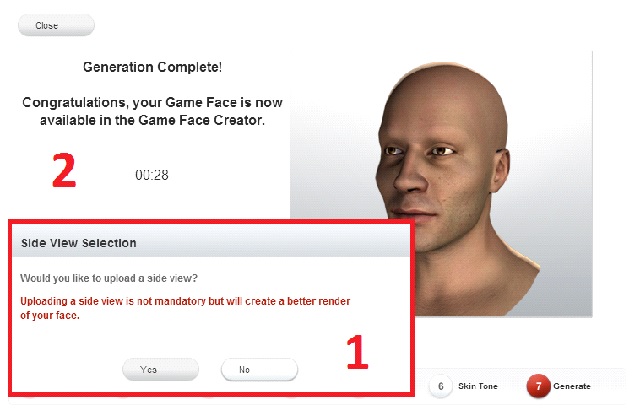
It is also possible to select the "side view" of the photo. If you click "Yes", you will still have to distribute the markers on yet another photo but, basing on that, the model will bear more resemblance to what you want to achieve. If you select "No", the app will start to process the selected picture and, when information "Generation Complete!" displays, you only need to click "Close".
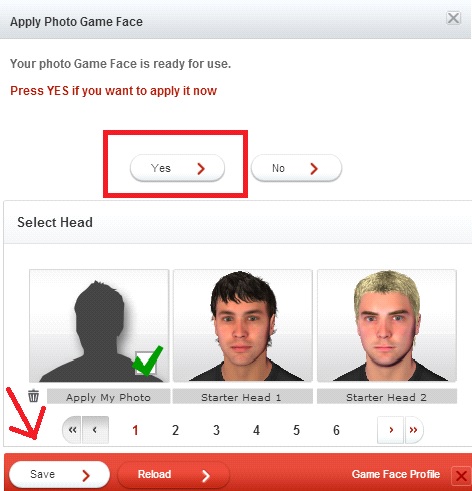
Save the changes that you have made and take to creating the player which you will then grant with the face that you have created.
Before you join a team, or create your own, you need to create your own Virtual Pro. Start by providing it with a name and selecting his day of birth, and nationality.
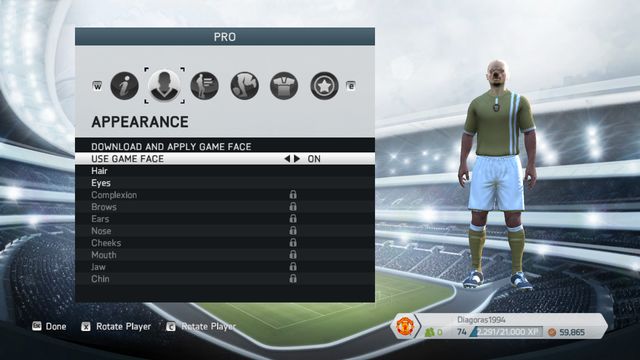
In the next tab, you can freely modify your pro's looks , as well as implement the face created in the Game Face app. To do that, you need to enable "Use Game Face" and click on "download and implement the Game Face".
Once you have enabled Game Face in FIFA 14, you can only edit the eyes and the hairstyle. In the following tabs, you can determine your player's position in the field, height and weight, as well as the additional features to activate during the game. Some of them can be purchased for coins in the EA Sports Football Club catalogue. After you have set all of the options, you can proceed on to creating the team, or searching for one.
To create your own team, you do not need to meet any requirements. The only thing you need to do is to fill in the required fields and click "Create a club". In the "Public club" option set "No" if you want the other people to join your club only after you send them an invitation. Change this option to "Friends only" so that everyone in your friends list could join the club without an invitation, or "Yes" if you want your club to be open for all players. You can also select your own stadium and change its name. As you progress in this mode, more and more stadiums will become available and you can change them before each match.
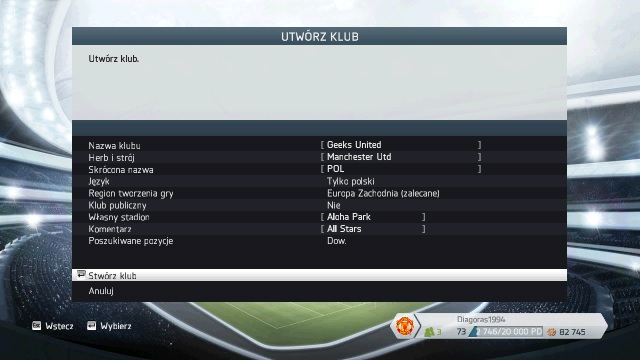
If you do not want to manage the entire club, you can search for a club to join. Still, this mode requires you to coordinate with your partner and games with a stranger may turn out to be a bit more difficult. It is a way better idea to ask your friend to create a team and send you an invitation.
From the club creator's viewpoint, there is only one more thing to do - forming a team. You can start fighting for points with, at least, two and friendly matches can be played on your own, by joining random games. Then, you only control your pro only. While playing for points, one of the players, apart from his own pro, needs to control the remaining players, save the pros created by his teammates.
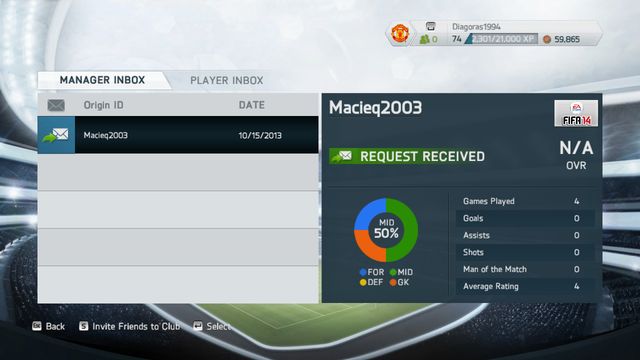
The hand-created players are always better than the remaining ones. This results in a situation where having more real-life players increases the chances for victory. It is worth noting that goalkeepers are very hesitant to defend here and even the simplest of shots, which would be defended in the other modes, may result in a goal. This means that it is a good idea to consider a person controlling the goalkeeper, in your team. A hand-created goalie infuses the entire team, which he is in, with great advantage. Of course, on condition that such a person is good at doing that.
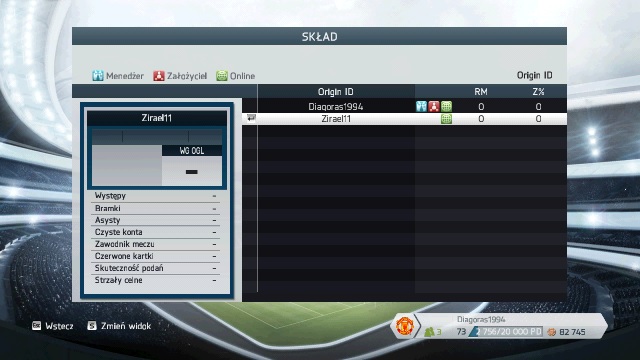
In the team view, you can charge a person with the role of the manager of the whole team, which entitles them to invite and expel players from the team. Also from the level of this window, you can expel the players who have not lived up to your expectations.
Seasons is a web based mode where players compete with each other for points by playing the actual teams. Each game can be played as a different team. This can be any of the best teams in the world, or the weakest available. The player's aim is to collect a specific number of points in each season to get promoted to the first league.
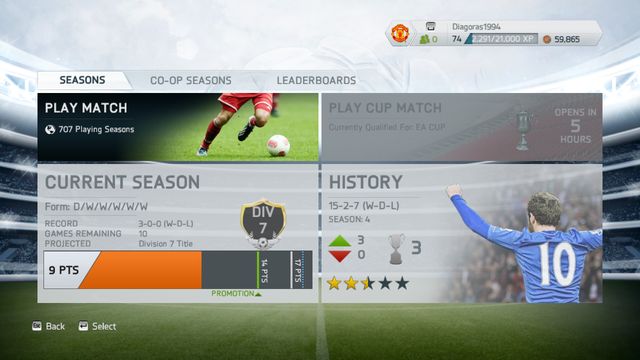
There is a total of 10 games for you to play during each season. Each game played in this mode starts with the top condition of each individual player. During the match, you can stop the game for a maximum of 3 times. To do this, you need to be in possession of the ball. The game stops for 40 seconds and, after this time passes, the game is resumed. The key to success in knowledge of both your opponent's formations and of your players' capabilities. It is also worthwhile to fight for spaces to pass over the defenders and for free kicks. This is how most goals are scored in this mode.
This is a new mode whose basics are the same as in the case of "Seasons". The only difference is that the games are played in the 2 vs. 2 system.
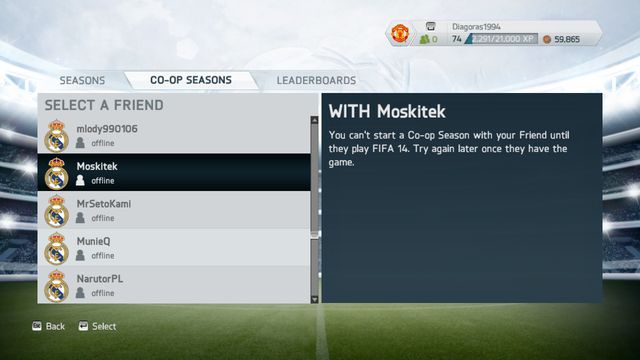
You start by selecting a friend from the list and the game starts. This time, the game differs from the other modes in that your friend takes over the player that you pass the ball to. After the next pass, you take over again. In the case of defense, you can operate simultaneously with your partner and switch between players without any restrictions. This means that you can control any of the players in the field, on condition that it is not the player controlled by your partner. Just like in the case of "Seasons", you need to play 10 games per season and your task is to win a specific number of points necessary for promotion. Also here, your goal is to get to the first league.
Name
Description
Type
Started From The Bottom...
Reach EA SPORTS Football Club Level 15.
Silver
It's Mine Now
Redeem an item from the Football Club Catalogue.
Bronze
Skills to Pay the Bills
Beat a Friend's score in Skill Games.
Silver
From Me To You
Gift a Football Club Catalogue item to a Friend
Bronze
Thanks, Tips
Follow a Football Club Recommendation
Bronze
No My Own
Complete a Be a Pro Challenge on any difficulty in Highlights of the Week.
Bronze
Big Game
Play a Game of the Week in Highlights of the Week.
Bronze
Challenging
Complete a Match Day Challenge in Highlights of the Week on at least World Class difficulty.
Silver
Teamwork
Win your first seasons match in Pro Clubs.
Bronze
On Your Way
Unlock 15% of the Pro Accomplishments in Pro Clubs.
Bronze
Best Friends Forever
Finish a season in Online Friendlies.
Silver
Bling Bling
Finish a season in Online Friendlies.
Silver
Just Dropped In
Play a Drop-In Match in Pro Clubs.
Bronze
Moving On Up
Earn Promotion in Seasons.
Silver
Bros Gonna Bro
Start a Co-op Season with a Friend.
Bronze
Rising Star
Be featured in the team of the week in your Career as a Player.
Silver
You Got Mail
Open up your inbox while advancing in Career.
Bronze
Control
Change your formation from the Team Management tile in Squad during your Career.
Bronze
Silverware
Win a trophy as a Team Manager in Career.
Silver
You Struck Gold
Scout and find a player with any combination of 3 Global Transfer Network attributes in Career
Silver
First Mission
Send a Scout on an Area Scouting mission.
Bronze
Long term signing
Apply a 99 Match Player Contract from the Catalogue to any player in FUT.
Bronze
Passing on the Armband
Change your captain in FUT.
Bronze
Hey Look, a Free Gold Pack!
Complete all Manager Tasks in FUT.
Silver
Collecting Silverware
Win a division title in FUT Seasons.
Gold
Fuel For My Club
Open 20 packs in FUT.
Silver
I Could Do This Every Week
Challenge the Team of the Week in FUT.
Bronze
Chemistry Experiment
Apply your first Chemistry Style consumable in FUT.
Bronze
We're Bros Now
Earn a player's loyalty in FUT by playing 10 or more games with him
Bronze
Start Building
Create a FUT Club.
Bronze
Fancy Some FUT?
Follow a Football Club News & Alert to start or enter FUT.
Bronze
So Skilled
Unlock a single Skill Challenge in Skill Games.
Bronze
Legendary
Become Legendary on one of the Skill Challenges in Skill Games.
Gold
Silver Lining
Complete the Silver stage of all Skill Games.
Silver
Perfection
Score a Perfect Hat Trick (left foot, right foot, header).
Silver
A Legendary Performance
Win a game on Legendary after trailing at half time.
Silver
Who needs a Weak Foot?
Score with an Outside of the Foot Shot.
Bronze
Extra effort
Score with a first time Sliding Shot.
Bronze
No goal for you!
Perform a Diving Header Clearance.
Bronze
Seconds, please
Win the ball back with a Second Chance Tackle.
Bronze
Beast Mode
Straight Arm a Defender to Protect the Ball.
Bronze
What a Hit, son!
Score with a Dipping Volley.
Bronze
Power and Movement
Score with a Curling Lace Shot.
Bronze
Football Legend
Unlock all other trophies (excluding additional content trophies)
Platinum
Name
Description
GS points
Power and Movement
Score with a Curling Lace Shot.
10
What a Hit, son!
Score with a Dipping Volley.
25
Beast Mode
Straight Arm a Defender to Protect the Ball.
10
Seconds, please!
Win the ball back with a Second Chance Tackle.
10
No goal for you!
Perform a Diving Header Clearance.
25
Extra effort
Score with a first time Sliding Shot.
25
Who needs a Weak Foot?
Score with an Outside of the Foot Shot.
10
A Legendary Performance
Win a game on Legendary after trailing at half time.
30
Perfection
Score a Perfect Hat Trick (left foot, right foot, header).
30
A Silver Lining
Complete the Silver stage of all Skill Games.
25
Legendary
Become Legendary on one of the Skill Challenges in Skill Games.
50
So Skilled
Unlock a single Skill Challenge in Skill Games.
25
Fancy Some FUT?
Follow a Football Club News & Alert to start or enter FUT.
5
Start Building
Create a FUT Club.
10
Chemistry Experiment
Apply your first Chemistry Style consumable in FUT.
10
I could do this Every week
Challenge the Team of the Week in FUT.
10
Fuel For My Club
Open 20 packs in FUT.
25
Collecting Silverware
Win a division title in FUT Seasons.
100
Hey Look, a Free Gold Pack!
Complete all Manager Tasks in FUT.
15
Passing on the Armband
Change your captain in FUT
5
Long term signing
Apply a 99 Match Player Contract from the Catalogue to any player in FUT
10
First Mission
Send a Scout on an Area Scouting mission.
5
You Struck Gold!
Scout and find a player with any combination of 3 Global Transfer Network attributes in Career
25
Silverware
Win a trophy as a Team Manager in Career.
50
Control
Change your formation from the Team Management tile in Squad during your Career.
5
You Got Mail
Open up your inbox while advancing in Career.
5
Rising Star
Be featured in the team of the week in your Career as a Player.
30
Bros gonna bro
Start a Co-op Season with a Friend.
10
Moving on up
Earn Promotion in Seasons.
55
Just Dropped In
Play a Drop-In Match in Pro Clubs.
10
Bling Bling
Finish a season in Online Friendlies.
100
Best Friends Forever
Finish a season in Online Friendlies.
30
On Your Way
Unlock 15% of the Pro Accomplishments in Pro Clubs.
50
Teamwork
Win your first seasons match in Pro Clubs.
15
Challenging
Complete a Match Day Challenge in Highlights of the Week on at least World Class difficulty.
30
Big Game
Play a Game of the Week in Highlights of the Week.
10
On my own
Complete a Be a Pro Challenge on any difficulty in Highlights of the Week.
20
Thanks, tips
Follow a Football Club Recommendation
5
From me, to you!
Gift a Football Club Catalogue item to a Friend
10
Skills to Pay the Bills!
Beat a Friend's score in Skill Games.
20
It's Mine Now
Redeem an item from the Football Club Catalogue.
10
Started From The Bottom...
Reach EA SPORTS Football Club Level 15.
30
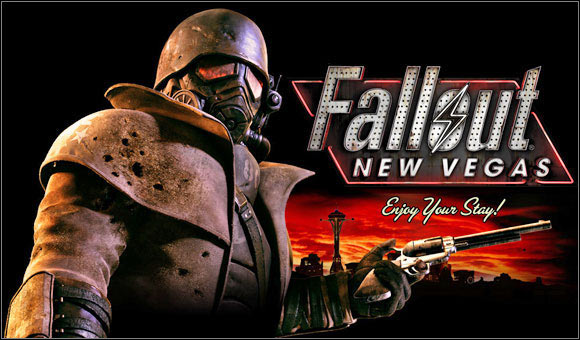


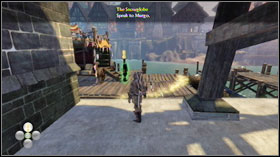
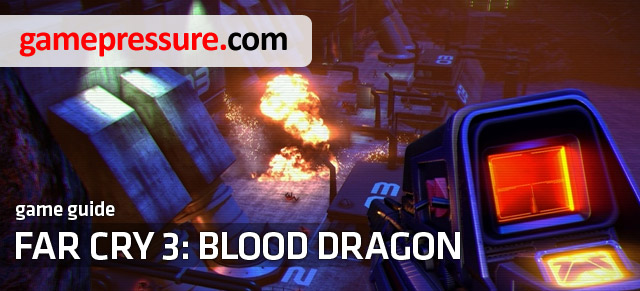 Far Cry 3: Blood Dragon Game Guide & Walkthrough
Far Cry 3: Blood Dragon Game Guide & Walkthrough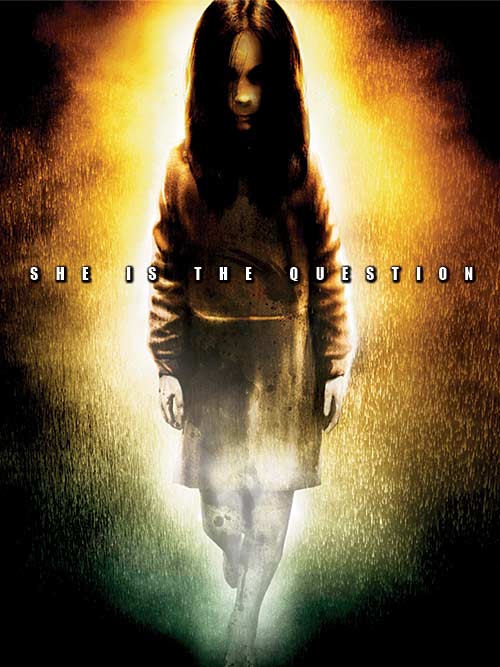 First Encounter Assault Recon Game Guide & Walkthrough
First Encounter Assault Recon Game Guide & Walkthrough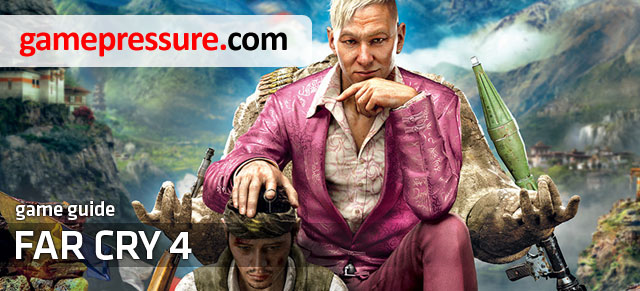 Far Cry 4 Game Guide & Walkthrough
Far Cry 4 Game Guide & Walkthrough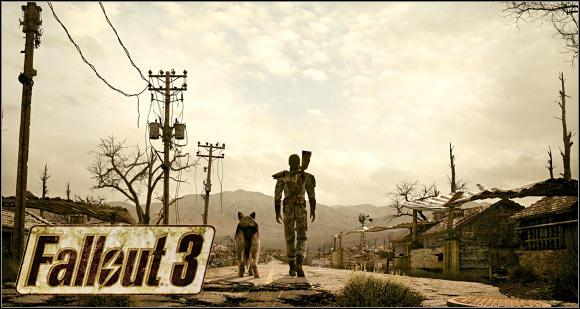 Fallout 3 Game Guide & Walkthrough
Fallout 3 Game Guide & Walkthrough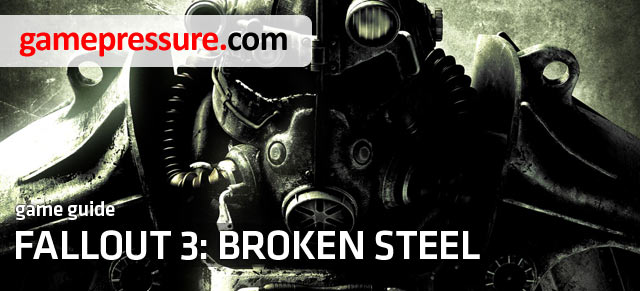 Fallout 3: Broken Steel Game Guide & Walkthrough
Fallout 3: Broken Steel Game Guide & Walkthrough